Report: Talent Management Challenges and Unilever's Strategy
VerifiedAdded on 2022/12/28
|21
|5007
|41
Report
AI Summary
This report delves into the critical aspects of talent management, focusing on the manufacturing sector and using Unilever as a case study. It begins with an introduction to talent management, emphasizing its importance in attracting and retaining a skilled workforce, and then provides background inf...
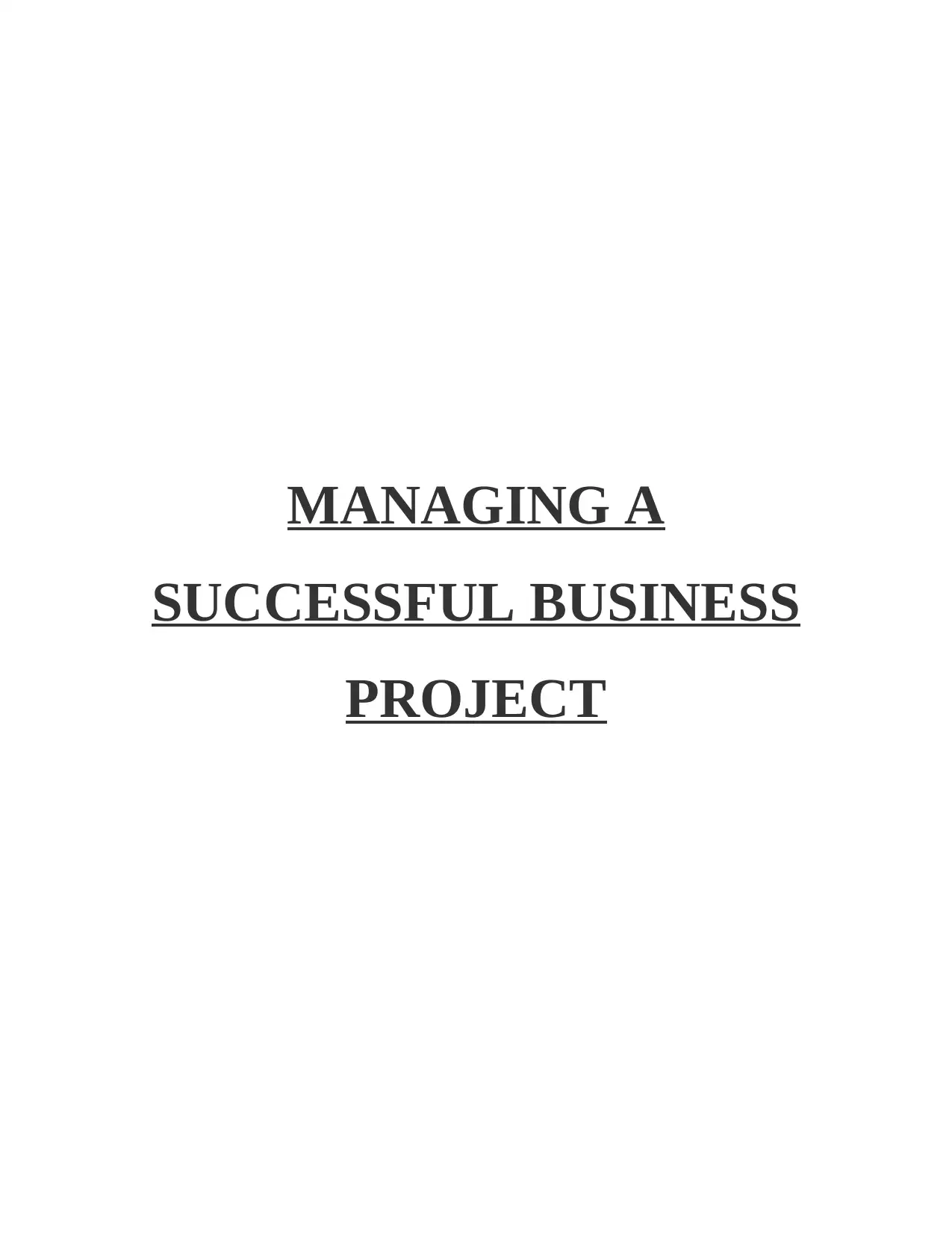
MANAGING A
SUCCESSFUL BUSINESS
PROJECT
SUCCESSFUL BUSINESS
PROJECT
Paraphrase This Document
Need a fresh take? Get an instant paraphrase of this document with our AI Paraphraser
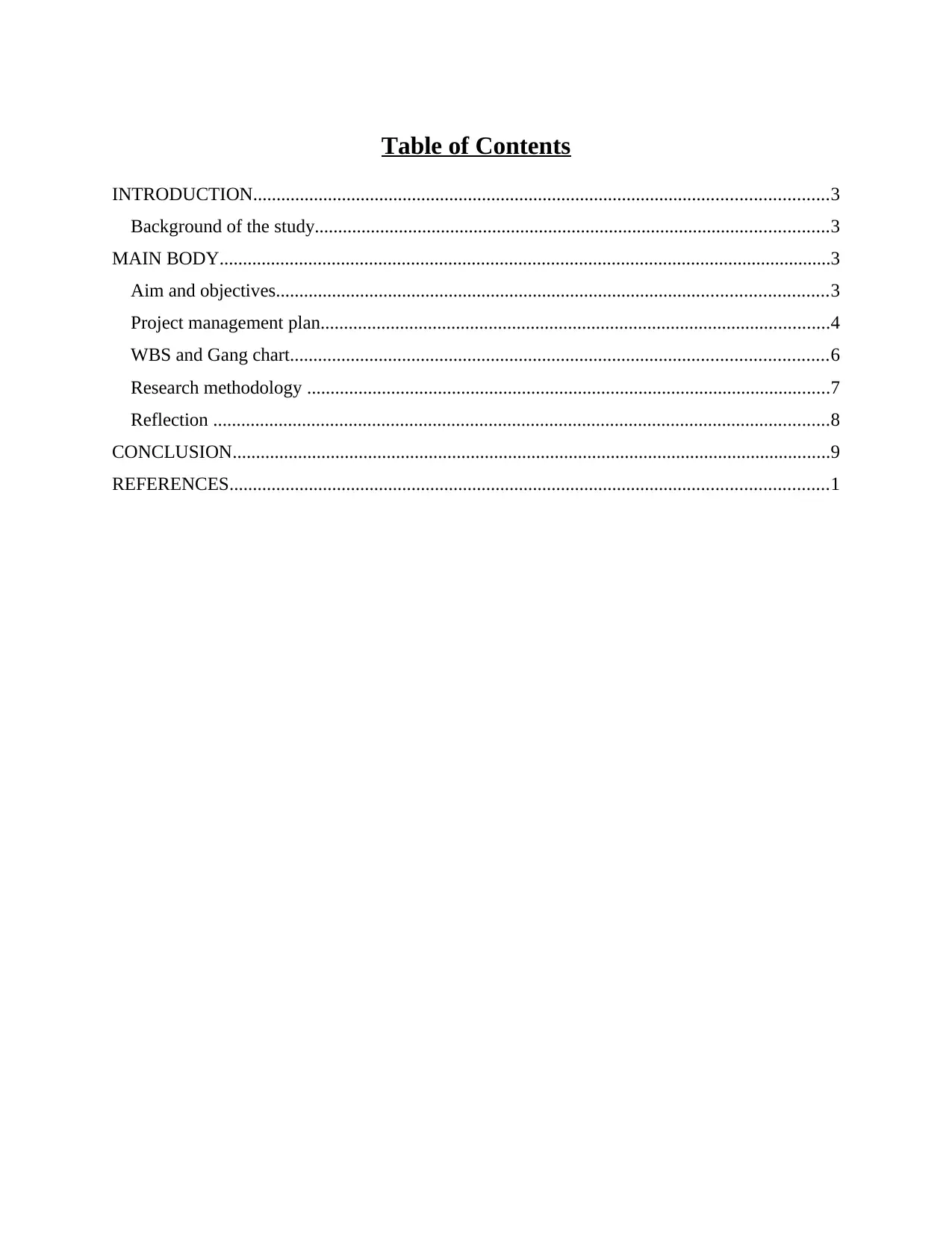
Table of Contents
INTRODUCTION...........................................................................................................................3
Background of the study..............................................................................................................3
MAIN BODY...................................................................................................................................3
Aim and objectives......................................................................................................................3
Project management plan.............................................................................................................4
WBS and Gang chart...................................................................................................................6
Research methodology ................................................................................................................7
Reflection ....................................................................................................................................8
CONCLUSION................................................................................................................................9
REFERENCES................................................................................................................................1
INTRODUCTION...........................................................................................................................3
Background of the study..............................................................................................................3
MAIN BODY...................................................................................................................................3
Aim and objectives......................................................................................................................3
Project management plan.............................................................................................................4
WBS and Gang chart...................................................................................................................6
Research methodology ................................................................................................................7
Reflection ....................................................................................................................................8
CONCLUSION................................................................................................................................9
REFERENCES................................................................................................................................1
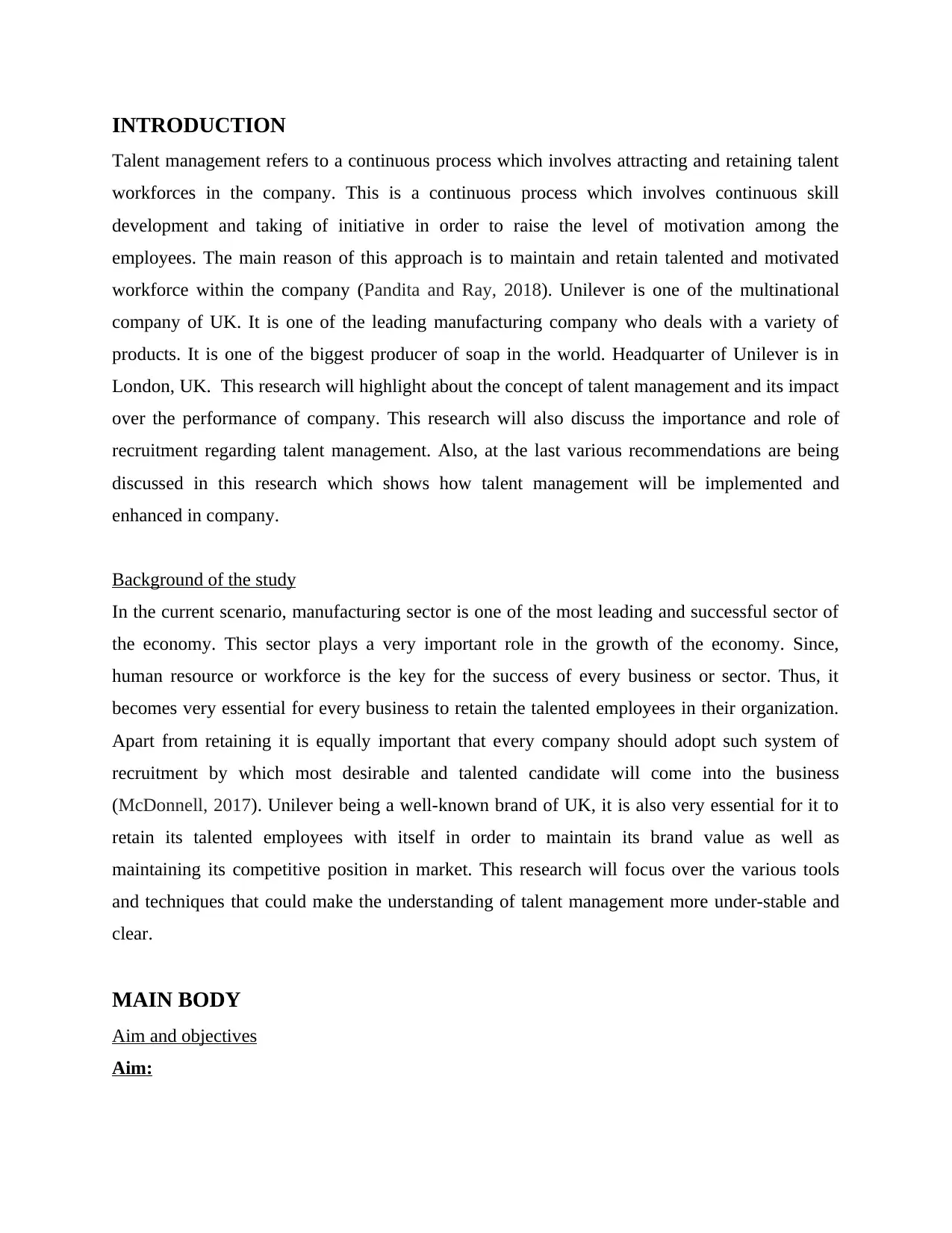
INTRODUCTION
Talent management refers to a continuous process which involves attracting and retaining talent
workforces in the company. This is a continuous process which involves continuous skill
development and taking of initiative in order to raise the level of motivation among the
employees. The main reason of this approach is to maintain and retain talented and motivated
workforce within the company (Pandita and Ray, 2018). Unilever is one of the multinational
company of UK. It is one of the leading manufacturing company who deals with a variety of
products. It is one of the biggest producer of soap in the world. Headquarter of Unilever is in
London, UK. This research will highlight about the concept of talent management and its impact
over the performance of company. This research will also discuss the importance and role of
recruitment regarding talent management. Also, at the last various recommendations are being
discussed in this research which shows how talent management will be implemented and
enhanced in company.
Background of the study
In the current scenario, manufacturing sector is one of the most leading and successful sector of
the economy. This sector plays a very important role in the growth of the economy. Since,
human resource or workforce is the key for the success of every business or sector. Thus, it
becomes very essential for every business to retain the talented employees in their organization.
Apart from retaining it is equally important that every company should adopt such system of
recruitment by which most desirable and talented candidate will come into the business
(McDonnell, 2017). Unilever being a well-known brand of UK, it is also very essential for it to
retain its talented employees with itself in order to maintain its brand value as well as
maintaining its competitive position in market. This research will focus over the various tools
and techniques that could make the understanding of talent management more under-stable and
clear.
MAIN BODY
Aim and objectives
Aim:
Talent management refers to a continuous process which involves attracting and retaining talent
workforces in the company. This is a continuous process which involves continuous skill
development and taking of initiative in order to raise the level of motivation among the
employees. The main reason of this approach is to maintain and retain talented and motivated
workforce within the company (Pandita and Ray, 2018). Unilever is one of the multinational
company of UK. It is one of the leading manufacturing company who deals with a variety of
products. It is one of the biggest producer of soap in the world. Headquarter of Unilever is in
London, UK. This research will highlight about the concept of talent management and its impact
over the performance of company. This research will also discuss the importance and role of
recruitment regarding talent management. Also, at the last various recommendations are being
discussed in this research which shows how talent management will be implemented and
enhanced in company.
Background of the study
In the current scenario, manufacturing sector is one of the most leading and successful sector of
the economy. This sector plays a very important role in the growth of the economy. Since,
human resource or workforce is the key for the success of every business or sector. Thus, it
becomes very essential for every business to retain the talented employees in their organization.
Apart from retaining it is equally important that every company should adopt such system of
recruitment by which most desirable and talented candidate will come into the business
(McDonnell, 2017). Unilever being a well-known brand of UK, it is also very essential for it to
retain its talented employees with itself in order to maintain its brand value as well as
maintaining its competitive position in market. This research will focus over the various tools
and techniques that could make the understanding of talent management more under-stable and
clear.
MAIN BODY
Aim and objectives
Aim:
You're viewing a preview
Unlock full access by subscribing today!
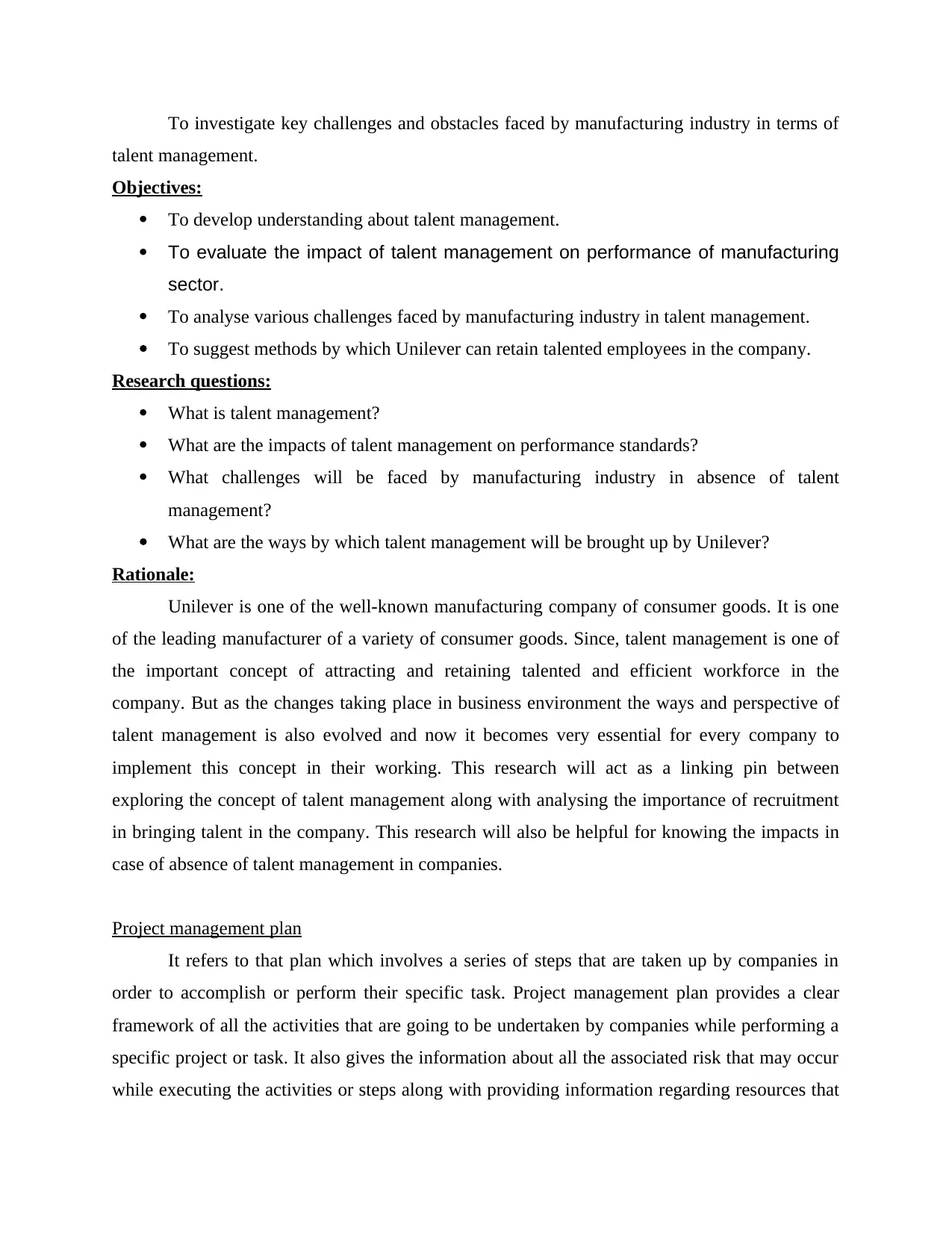
To investigate key challenges and obstacles faced by manufacturing industry in terms of
talent management.
Objectives:
To develop understanding about talent management.
To evaluate the impact of talent management on performance of manufacturing
sector.
To analyse various challenges faced by manufacturing industry in talent management.
To suggest methods by which Unilever can retain talented employees in the company.
Research questions:
What is talent management?
What are the impacts of talent management on performance standards?
What challenges will be faced by manufacturing industry in absence of talent
management?
What are the ways by which talent management will be brought up by Unilever?
Rationale:
Unilever is one of the well-known manufacturing company of consumer goods. It is one
of the leading manufacturer of a variety of consumer goods. Since, talent management is one of
the important concept of attracting and retaining talented and efficient workforce in the
company. But as the changes taking place in business environment the ways and perspective of
talent management is also evolved and now it becomes very essential for every company to
implement this concept in their working. This research will act as a linking pin between
exploring the concept of talent management along with analysing the importance of recruitment
in bringing talent in the company. This research will also be helpful for knowing the impacts in
case of absence of talent management in companies.
Project management plan
It refers to that plan which involves a series of steps that are taken up by companies in
order to accomplish or perform their specific task. Project management plan provides a clear
framework of all the activities that are going to be undertaken by companies while performing a
specific project or task. It also gives the information about all the associated risk that may occur
while executing the activities or steps along with providing information regarding resources that
talent management.
Objectives:
To develop understanding about talent management.
To evaluate the impact of talent management on performance of manufacturing
sector.
To analyse various challenges faced by manufacturing industry in talent management.
To suggest methods by which Unilever can retain talented employees in the company.
Research questions:
What is talent management?
What are the impacts of talent management on performance standards?
What challenges will be faced by manufacturing industry in absence of talent
management?
What are the ways by which talent management will be brought up by Unilever?
Rationale:
Unilever is one of the well-known manufacturing company of consumer goods. It is one
of the leading manufacturer of a variety of consumer goods. Since, talent management is one of
the important concept of attracting and retaining talented and efficient workforce in the
company. But as the changes taking place in business environment the ways and perspective of
talent management is also evolved and now it becomes very essential for every company to
implement this concept in their working. This research will act as a linking pin between
exploring the concept of talent management along with analysing the importance of recruitment
in bringing talent in the company. This research will also be helpful for knowing the impacts in
case of absence of talent management in companies.
Project management plan
It refers to that plan which involves a series of steps that are taken up by companies in
order to accomplish or perform their specific task. Project management plan provides a clear
framework of all the activities that are going to be undertaken by companies while performing a
specific project or task. It also gives the information about all the associated risk that may occur
while executing the activities or steps along with providing information regarding resources that
Paraphrase This Document
Need a fresh take? Get an instant paraphrase of this document with our AI Paraphraser
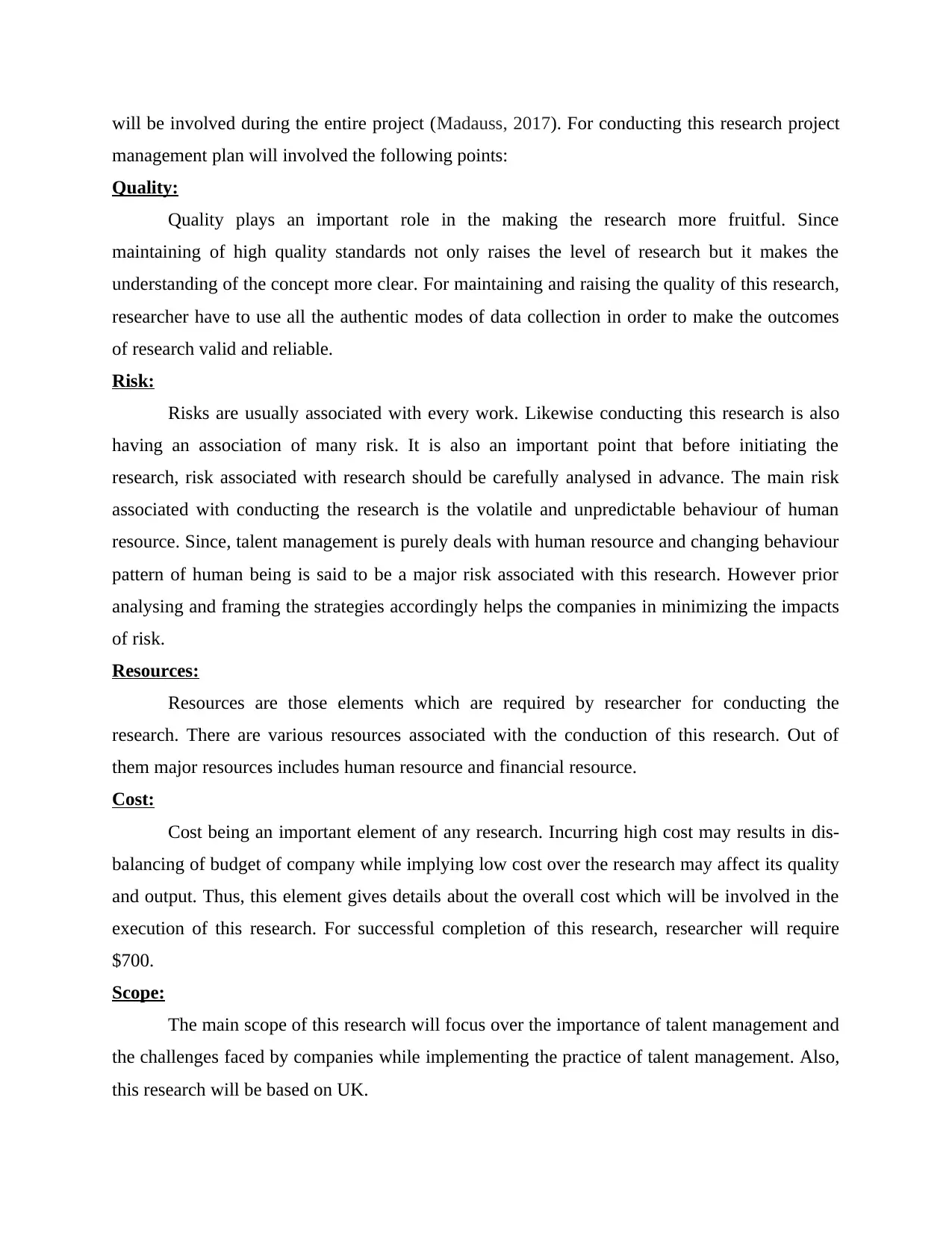
will be involved during the entire project (Madauss, 2017). For conducting this research project
management plan will involved the following points:
Quality:
Quality plays an important role in the making the research more fruitful. Since
maintaining of high quality standards not only raises the level of research but it makes the
understanding of the concept more clear. For maintaining and raising the quality of this research,
researcher have to use all the authentic modes of data collection in order to make the outcomes
of research valid and reliable.
Risk:
Risks are usually associated with every work. Likewise conducting this research is also
having an association of many risk. It is also an important point that before initiating the
research, risk associated with research should be carefully analysed in advance. The main risk
associated with conducting the research is the volatile and unpredictable behaviour of human
resource. Since, talent management is purely deals with human resource and changing behaviour
pattern of human being is said to be a major risk associated with this research. However prior
analysing and framing the strategies accordingly helps the companies in minimizing the impacts
of risk.
Resources:
Resources are those elements which are required by researcher for conducting the
research. There are various resources associated with the conduction of this research. Out of
them major resources includes human resource and financial resource.
Cost:
Cost being an important element of any research. Incurring high cost may results in dis-
balancing of budget of company while implying low cost over the research may affect its quality
and output. Thus, this element gives details about the overall cost which will be involved in the
execution of this research. For successful completion of this research, researcher will require
$700.
Scope:
The main scope of this research will focus over the importance of talent management and
the challenges faced by companies while implementing the practice of talent management. Also,
this research will be based on UK.
management plan will involved the following points:
Quality:
Quality plays an important role in the making the research more fruitful. Since
maintaining of high quality standards not only raises the level of research but it makes the
understanding of the concept more clear. For maintaining and raising the quality of this research,
researcher have to use all the authentic modes of data collection in order to make the outcomes
of research valid and reliable.
Risk:
Risks are usually associated with every work. Likewise conducting this research is also
having an association of many risk. It is also an important point that before initiating the
research, risk associated with research should be carefully analysed in advance. The main risk
associated with conducting the research is the volatile and unpredictable behaviour of human
resource. Since, talent management is purely deals with human resource and changing behaviour
pattern of human being is said to be a major risk associated with this research. However prior
analysing and framing the strategies accordingly helps the companies in minimizing the impacts
of risk.
Resources:
Resources are those elements which are required by researcher for conducting the
research. There are various resources associated with the conduction of this research. Out of
them major resources includes human resource and financial resource.
Cost:
Cost being an important element of any research. Incurring high cost may results in dis-
balancing of budget of company while implying low cost over the research may affect its quality
and output. Thus, this element gives details about the overall cost which will be involved in the
execution of this research. For successful completion of this research, researcher will require
$700.
Scope:
The main scope of this research will focus over the importance of talent management and
the challenges faced by companies while implementing the practice of talent management. Also,
this research will be based on UK.
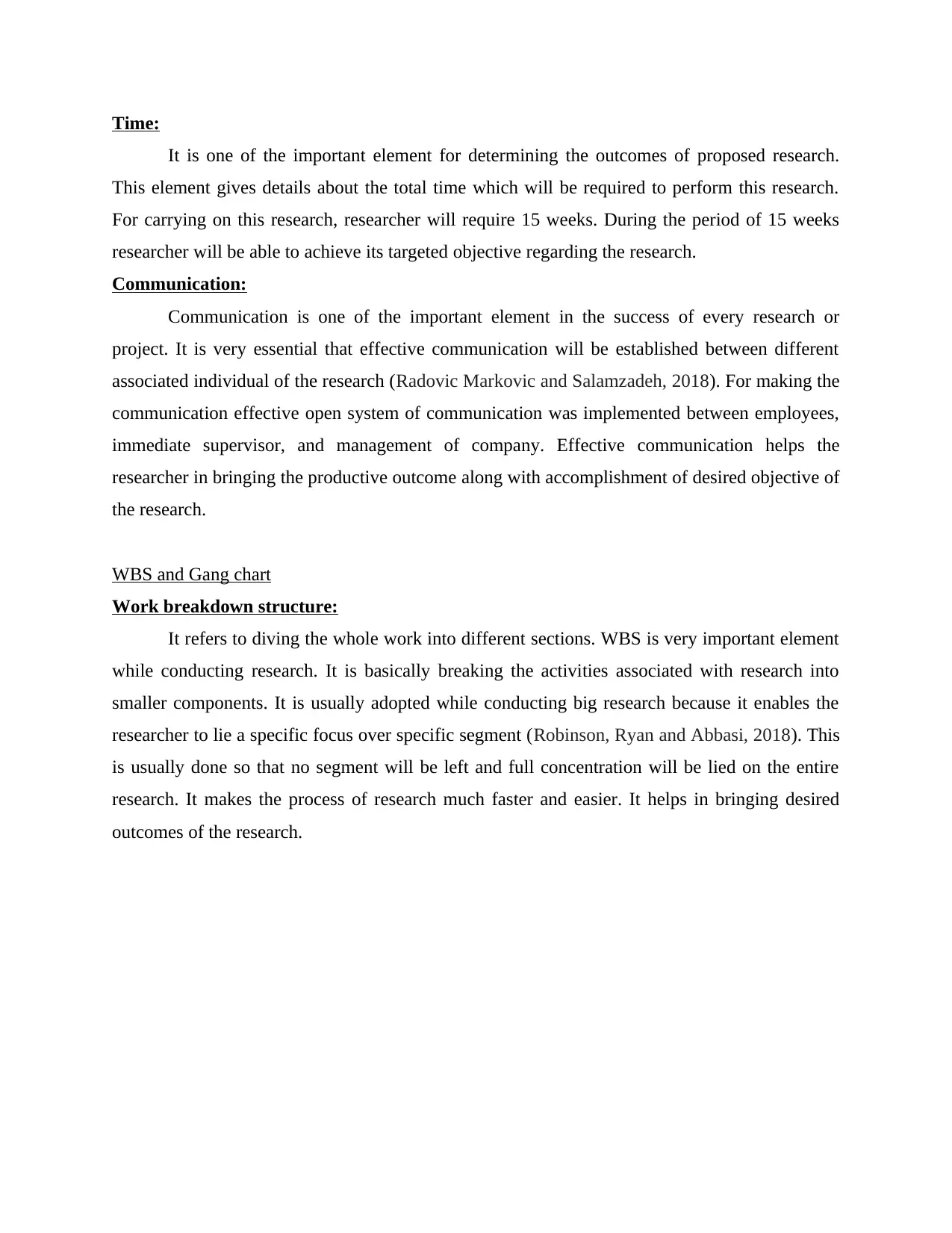
Time:
It is one of the important element for determining the outcomes of proposed research.
This element gives details about the total time which will be required to perform this research.
For carrying on this research, researcher will require 15 weeks. During the period of 15 weeks
researcher will be able to achieve its targeted objective regarding the research.
Communication:
Communication is one of the important element in the success of every research or
project. It is very essential that effective communication will be established between different
associated individual of the research (Radovic Markovic and Salamzadeh, 2018). For making the
communication effective open system of communication was implemented between employees,
immediate supervisor, and management of company. Effective communication helps the
researcher in bringing the productive outcome along with accomplishment of desired objective of
the research.
WBS and Gang chart
Work breakdown structure:
It refers to diving the whole work into different sections. WBS is very important element
while conducting research. It is basically breaking the activities associated with research into
smaller components. It is usually adopted while conducting big research because it enables the
researcher to lie a specific focus over specific segment (Robinson, Ryan and Abbasi, 2018). This
is usually done so that no segment will be left and full concentration will be lied on the entire
research. It makes the process of research much faster and easier. It helps in bringing desired
outcomes of the research.
It is one of the important element for determining the outcomes of proposed research.
This element gives details about the total time which will be required to perform this research.
For carrying on this research, researcher will require 15 weeks. During the period of 15 weeks
researcher will be able to achieve its targeted objective regarding the research.
Communication:
Communication is one of the important element in the success of every research or
project. It is very essential that effective communication will be established between different
associated individual of the research (Radovic Markovic and Salamzadeh, 2018). For making the
communication effective open system of communication was implemented between employees,
immediate supervisor, and management of company. Effective communication helps the
researcher in bringing the productive outcome along with accomplishment of desired objective of
the research.
WBS and Gang chart
Work breakdown structure:
It refers to diving the whole work into different sections. WBS is very important element
while conducting research. It is basically breaking the activities associated with research into
smaller components. It is usually adopted while conducting big research because it enables the
researcher to lie a specific focus over specific segment (Robinson, Ryan and Abbasi, 2018). This
is usually done so that no segment will be left and full concentration will be lied on the entire
research. It makes the process of research much faster and easier. It helps in bringing desired
outcomes of the research.
You're viewing a preview
Unlock full access by subscribing today!
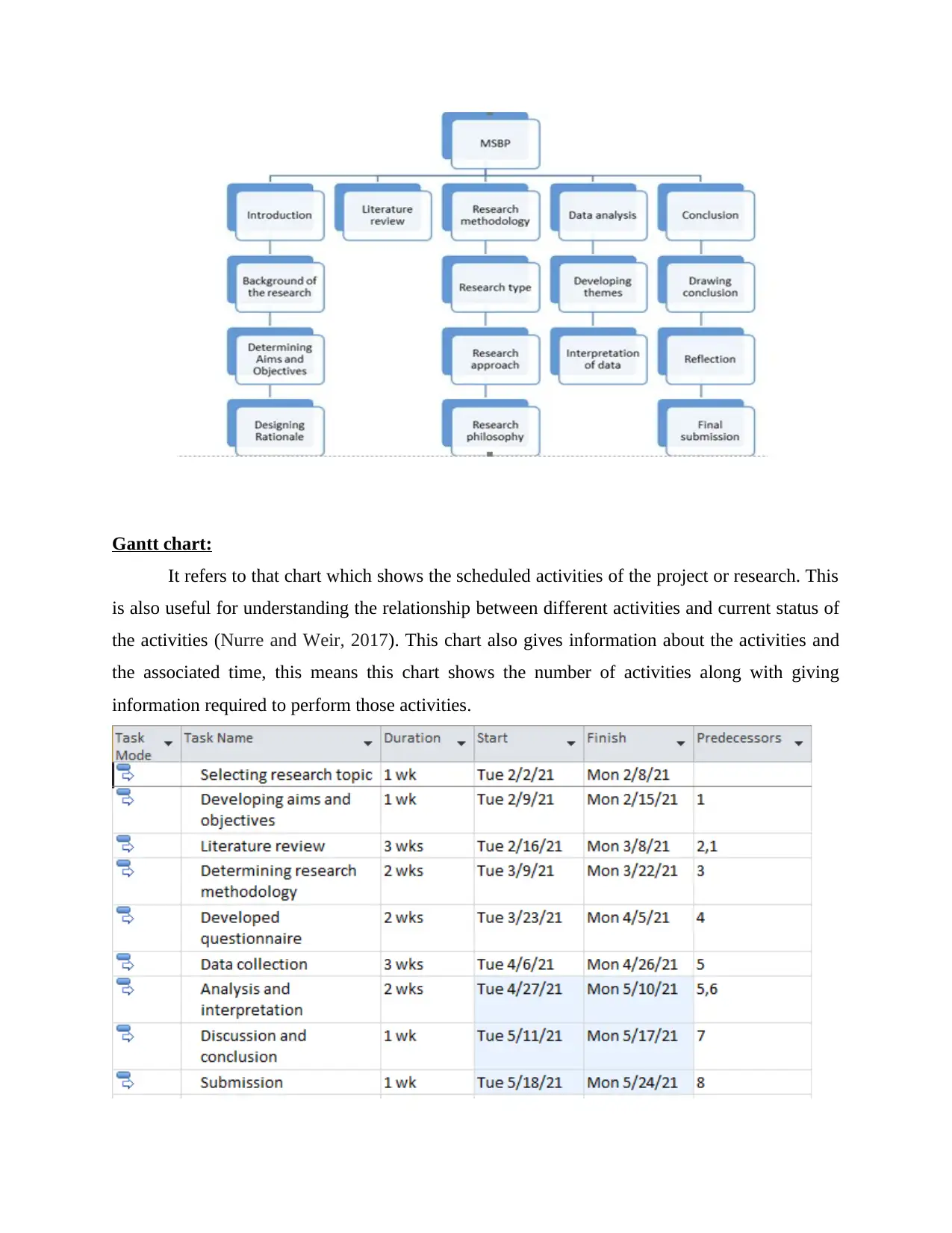
Gantt chart:
It refers to that chart which shows the scheduled activities of the project or research. This
is also useful for understanding the relationship between different activities and current status of
the activities (Nurre and Weir, 2017). This chart also gives information about the activities and
the associated time, this means this chart shows the number of activities along with giving
information required to perform those activities.
It refers to that chart which shows the scheduled activities of the project or research. This
is also useful for understanding the relationship between different activities and current status of
the activities (Nurre and Weir, 2017). This chart also gives information about the activities and
the associated time, this means this chart shows the number of activities along with giving
information required to perform those activities.
Paraphrase This Document
Need a fresh take? Get an instant paraphrase of this document with our AI Paraphraser
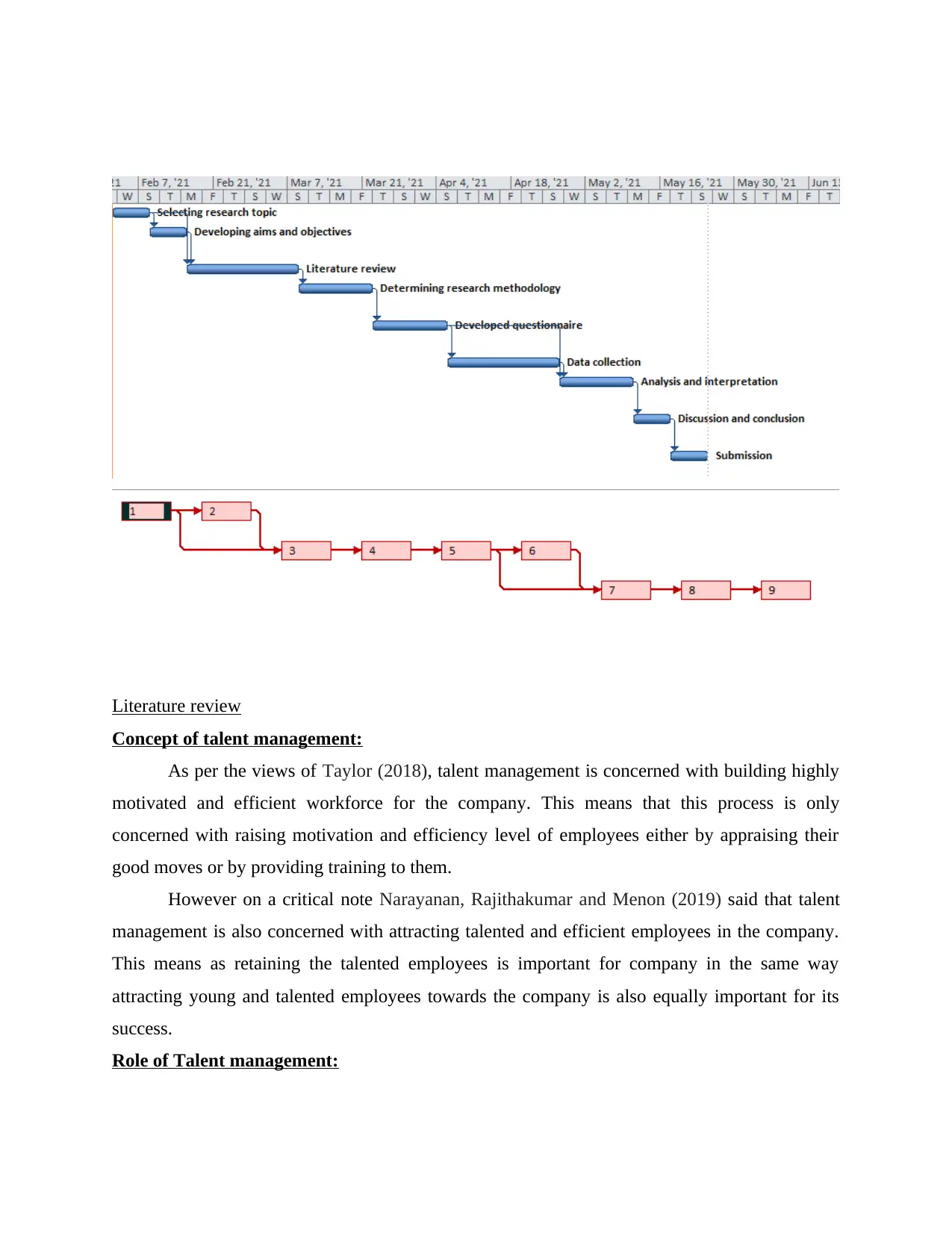
Literature review
Concept of talent management:
As per the views of Taylor (2018), talent management is concerned with building highly
motivated and efficient workforce for the company. This means that this process is only
concerned with raising motivation and efficiency level of employees either by appraising their
good moves or by providing training to them.
However on a critical note Narayanan, Rajithakumar and Menon (2019) said that talent
management is also concerned with attracting talented and efficient employees in the company.
This means as retaining the talented employees is important for company in the same way
attracting young and talented employees towards the company is also equally important for its
success.
Role of Talent management:
Concept of talent management:
As per the views of Taylor (2018), talent management is concerned with building highly
motivated and efficient workforce for the company. This means that this process is only
concerned with raising motivation and efficiency level of employees either by appraising their
good moves or by providing training to them.
However on a critical note Narayanan, Rajithakumar and Menon (2019) said that talent
management is also concerned with attracting talented and efficient employees in the company.
This means as retaining the talented employees is important for company in the same way
attracting young and talented employees towards the company is also equally important for its
success.
Role of Talent management:
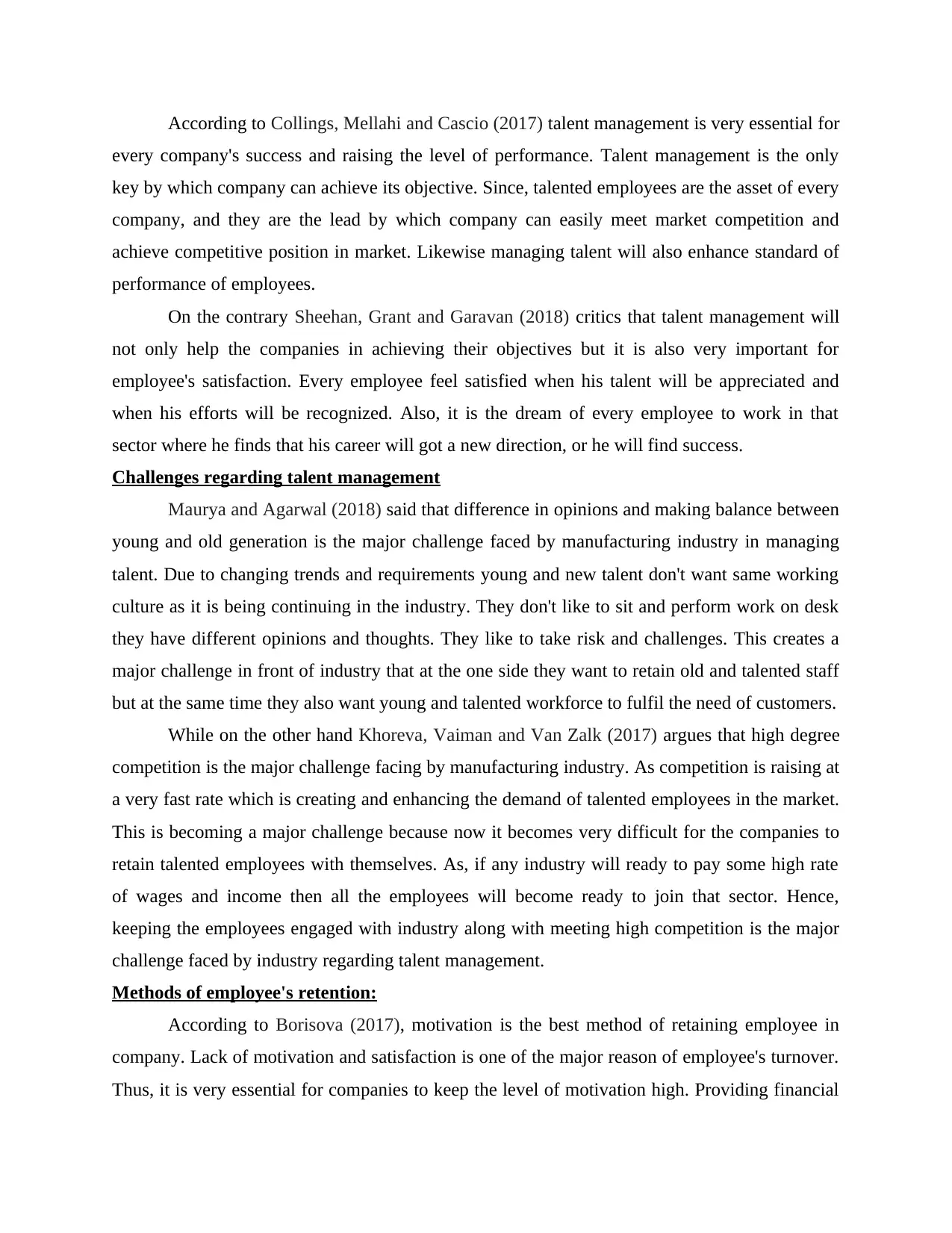
According to Collings, Mellahi and Cascio (2017) talent management is very essential for
every company's success and raising the level of performance. Talent management is the only
key by which company can achieve its objective. Since, talented employees are the asset of every
company, and they are the lead by which company can easily meet market competition and
achieve competitive position in market. Likewise managing talent will also enhance standard of
performance of employees.
On the contrary Sheehan, Grant and Garavan (2018) critics that talent management will
not only help the companies in achieving their objectives but it is also very important for
employee's satisfaction. Every employee feel satisfied when his talent will be appreciated and
when his efforts will be recognized. Also, it is the dream of every employee to work in that
sector where he finds that his career will got a new direction, or he will find success.
Challenges regarding talent management
Maurya and Agarwal (2018) said that difference in opinions and making balance between
young and old generation is the major challenge faced by manufacturing industry in managing
talent. Due to changing trends and requirements young and new talent don't want same working
culture as it is being continuing in the industry. They don't like to sit and perform work on desk
they have different opinions and thoughts. They like to take risk and challenges. This creates a
major challenge in front of industry that at the one side they want to retain old and talented staff
but at the same time they also want young and talented workforce to fulfil the need of customers.
While on the other hand Khoreva, Vaiman and Van Zalk (2017) argues that high degree
competition is the major challenge facing by manufacturing industry. As competition is raising at
a very fast rate which is creating and enhancing the demand of talented employees in the market.
This is becoming a major challenge because now it becomes very difficult for the companies to
retain talented employees with themselves. As, if any industry will ready to pay some high rate
of wages and income then all the employees will become ready to join that sector. Hence,
keeping the employees engaged with industry along with meeting high competition is the major
challenge faced by industry regarding talent management.
Methods of employee's retention:
According to Borisova (2017), motivation is the best method of retaining employee in
company. Lack of motivation and satisfaction is one of the major reason of employee's turnover.
Thus, it is very essential for companies to keep the level of motivation high. Providing financial
every company's success and raising the level of performance. Talent management is the only
key by which company can achieve its objective. Since, talented employees are the asset of every
company, and they are the lead by which company can easily meet market competition and
achieve competitive position in market. Likewise managing talent will also enhance standard of
performance of employees.
On the contrary Sheehan, Grant and Garavan (2018) critics that talent management will
not only help the companies in achieving their objectives but it is also very important for
employee's satisfaction. Every employee feel satisfied when his talent will be appreciated and
when his efforts will be recognized. Also, it is the dream of every employee to work in that
sector where he finds that his career will got a new direction, or he will find success.
Challenges regarding talent management
Maurya and Agarwal (2018) said that difference in opinions and making balance between
young and old generation is the major challenge faced by manufacturing industry in managing
talent. Due to changing trends and requirements young and new talent don't want same working
culture as it is being continuing in the industry. They don't like to sit and perform work on desk
they have different opinions and thoughts. They like to take risk and challenges. This creates a
major challenge in front of industry that at the one side they want to retain old and talented staff
but at the same time they also want young and talented workforce to fulfil the need of customers.
While on the other hand Khoreva, Vaiman and Van Zalk (2017) argues that high degree
competition is the major challenge facing by manufacturing industry. As competition is raising at
a very fast rate which is creating and enhancing the demand of talented employees in the market.
This is becoming a major challenge because now it becomes very difficult for the companies to
retain talented employees with themselves. As, if any industry will ready to pay some high rate
of wages and income then all the employees will become ready to join that sector. Hence,
keeping the employees engaged with industry along with meeting high competition is the major
challenge faced by industry regarding talent management.
Methods of employee's retention:
According to Borisova (2017), motivation is the best method of retaining employee in
company. Lack of motivation and satisfaction is one of the major reason of employee's turnover.
Thus, it is very essential for companies to keep the level of motivation high. Providing financial
You're viewing a preview
Unlock full access by subscribing today!
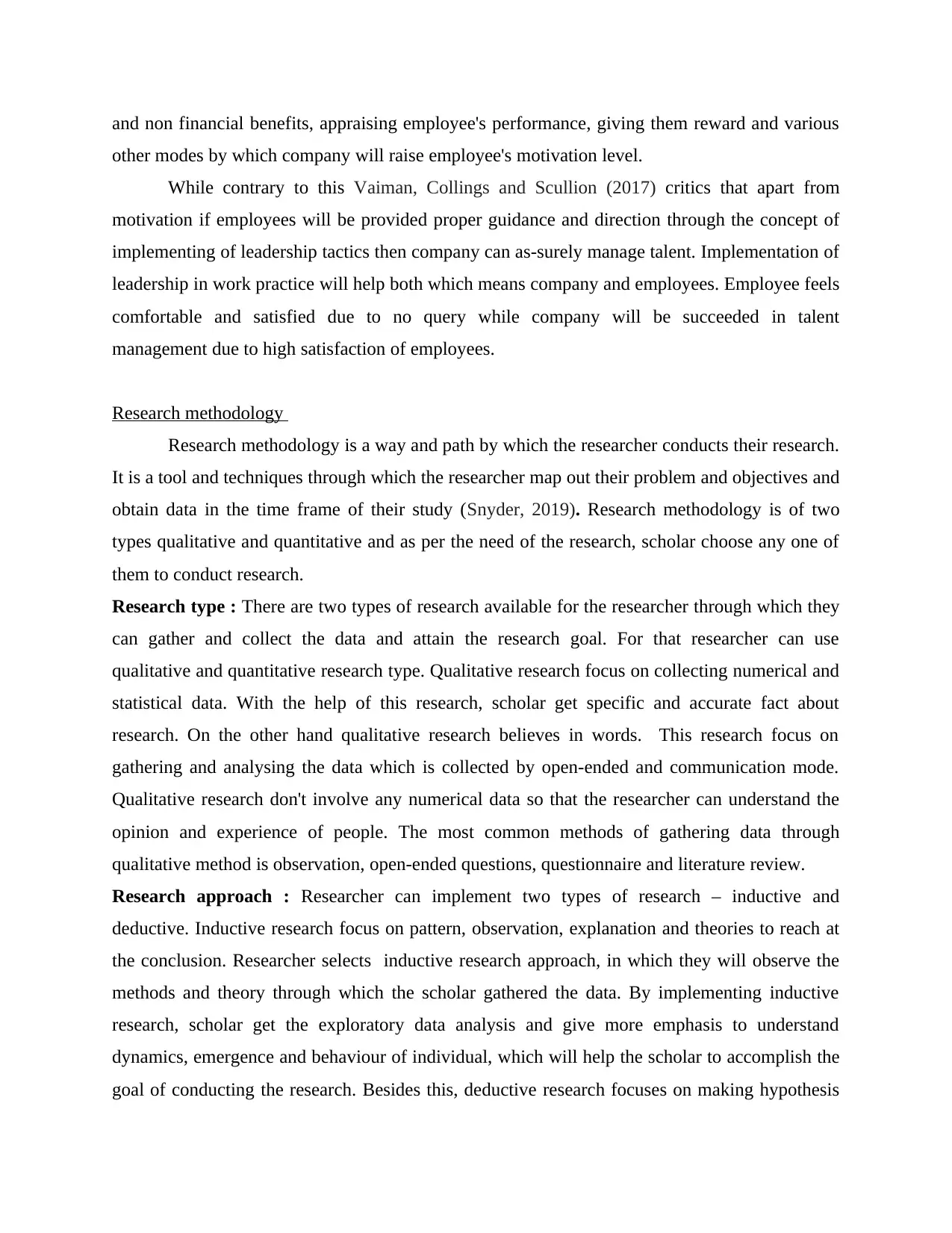
and non financial benefits, appraising employee's performance, giving them reward and various
other modes by which company will raise employee's motivation level.
While contrary to this Vaiman, Collings and Scullion (2017) critics that apart from
motivation if employees will be provided proper guidance and direction through the concept of
implementing of leadership tactics then company can as-surely manage talent. Implementation of
leadership in work practice will help both which means company and employees. Employee feels
comfortable and satisfied due to no query while company will be succeeded in talent
management due to high satisfaction of employees.
Research methodology
Research methodology is a way and path by which the researcher conducts their research.
It is a tool and techniques through which the researcher map out their problem and objectives and
obtain data in the time frame of their study (Snyder, 2019). Research methodology is of two
types qualitative and quantitative and as per the need of the research, scholar choose any one of
them to conduct research.
Research type : There are two types of research available for the researcher through which they
can gather and collect the data and attain the research goal. For that researcher can use
qualitative and quantitative research type. Qualitative research focus on collecting numerical and
statistical data. With the help of this research, scholar get specific and accurate fact about
research. On the other hand qualitative research believes in words. This research focus on
gathering and analysing the data which is collected by open-ended and communication mode.
Qualitative research don't involve any numerical data so that the researcher can understand the
opinion and experience of people. The most common methods of gathering data through
qualitative method is observation, open-ended questions, questionnaire and literature review.
Research approach : Researcher can implement two types of research – inductive and
deductive. Inductive research focus on pattern, observation, explanation and theories to reach at
the conclusion. Researcher selects inductive research approach, in which they will observe the
methods and theory through which the scholar gathered the data. By implementing inductive
research, scholar get the exploratory data analysis and give more emphasis to understand
dynamics, emergence and behaviour of individual, which will help the scholar to accomplish the
goal of conducting the research. Besides this, deductive research focuses on making hypothesis
other modes by which company will raise employee's motivation level.
While contrary to this Vaiman, Collings and Scullion (2017) critics that apart from
motivation if employees will be provided proper guidance and direction through the concept of
implementing of leadership tactics then company can as-surely manage talent. Implementation of
leadership in work practice will help both which means company and employees. Employee feels
comfortable and satisfied due to no query while company will be succeeded in talent
management due to high satisfaction of employees.
Research methodology
Research methodology is a way and path by which the researcher conducts their research.
It is a tool and techniques through which the researcher map out their problem and objectives and
obtain data in the time frame of their study (Snyder, 2019). Research methodology is of two
types qualitative and quantitative and as per the need of the research, scholar choose any one of
them to conduct research.
Research type : There are two types of research available for the researcher through which they
can gather and collect the data and attain the research goal. For that researcher can use
qualitative and quantitative research type. Qualitative research focus on collecting numerical and
statistical data. With the help of this research, scholar get specific and accurate fact about
research. On the other hand qualitative research believes in words. This research focus on
gathering and analysing the data which is collected by open-ended and communication mode.
Qualitative research don't involve any numerical data so that the researcher can understand the
opinion and experience of people. The most common methods of gathering data through
qualitative method is observation, open-ended questions, questionnaire and literature review.
Research approach : Researcher can implement two types of research – inductive and
deductive. Inductive research focus on pattern, observation, explanation and theories to reach at
the conclusion. Researcher selects inductive research approach, in which they will observe the
methods and theory through which the scholar gathered the data. By implementing inductive
research, scholar get the exploratory data analysis and give more emphasis to understand
dynamics, emergence and behaviour of individual, which will help the scholar to accomplish the
goal of conducting the research. Besides this, deductive research focuses on making hypothesis
Paraphrase This Document
Need a fresh take? Get an instant paraphrase of this document with our AI Paraphraser
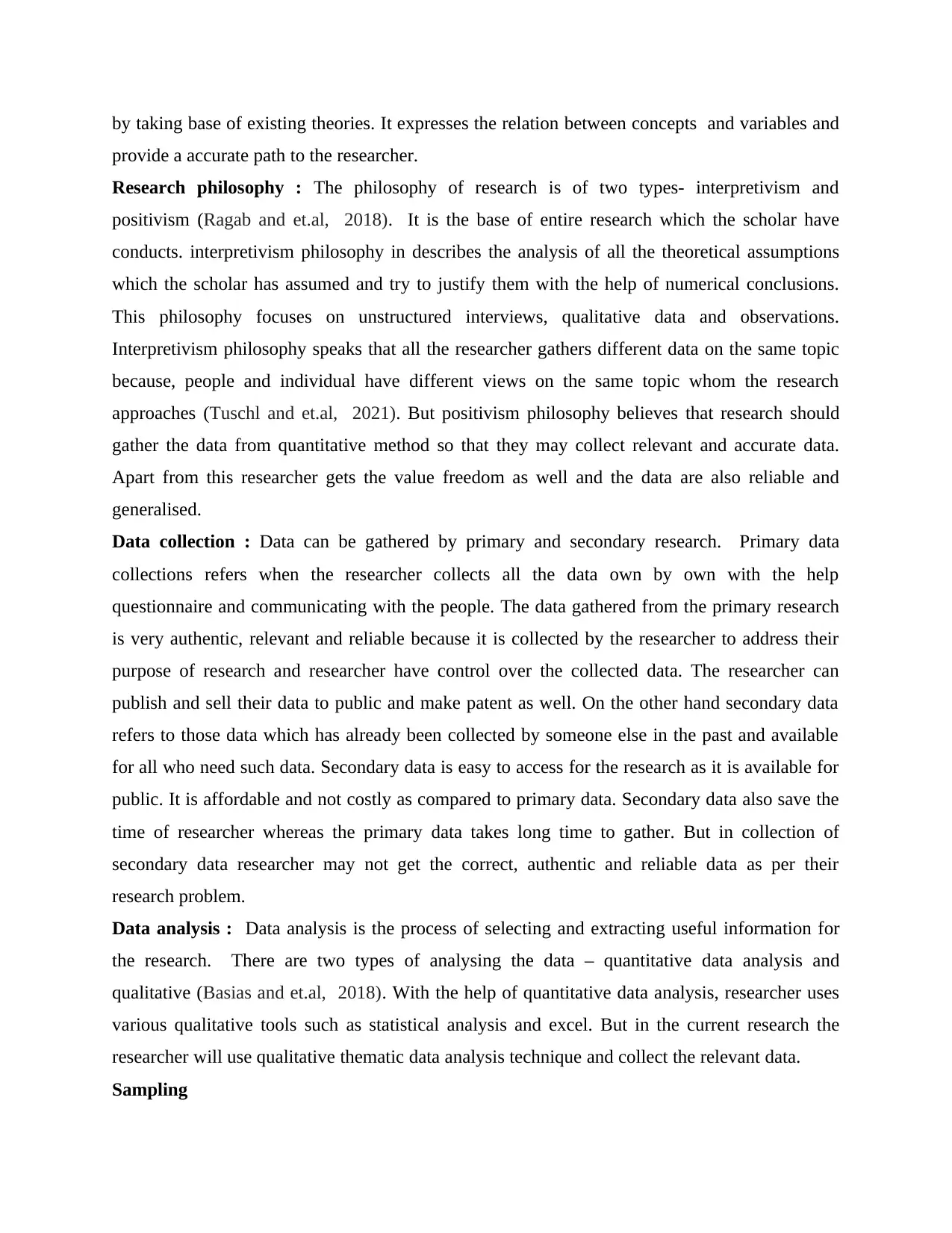
by taking base of existing theories. It expresses the relation between concepts and variables and
provide a accurate path to the researcher.
Research philosophy : The philosophy of research is of two types- interpretivism and
positivism (Ragab and et.al, 2018). It is the base of entire research which the scholar have
conducts. interpretivism philosophy in describes the analysis of all the theoretical assumptions
which the scholar has assumed and try to justify them with the help of numerical conclusions.
This philosophy focuses on unstructured interviews, qualitative data and observations.
Interpretivism philosophy speaks that all the researcher gathers different data on the same topic
because, people and individual have different views on the same topic whom the research
approaches (Tuschl and et.al, 2021). But positivism philosophy believes that research should
gather the data from quantitative method so that they may collect relevant and accurate data.
Apart from this researcher gets the value freedom as well and the data are also reliable and
generalised.
Data collection : Data can be gathered by primary and secondary research. Primary data
collections refers when the researcher collects all the data own by own with the help
questionnaire and communicating with the people. The data gathered from the primary research
is very authentic, relevant and reliable because it is collected by the researcher to address their
purpose of research and researcher have control over the collected data. The researcher can
publish and sell their data to public and make patent as well. On the other hand secondary data
refers to those data which has already been collected by someone else in the past and available
for all who need such data. Secondary data is easy to access for the research as it is available for
public. It is affordable and not costly as compared to primary data. Secondary data also save the
time of researcher whereas the primary data takes long time to gather. But in collection of
secondary data researcher may not get the correct, authentic and reliable data as per their
research problem.
Data analysis : Data analysis is the process of selecting and extracting useful information for
the research. There are two types of analysing the data – quantitative data analysis and
qualitative (Basias and et.al, 2018). With the help of quantitative data analysis, researcher uses
various qualitative tools such as statistical analysis and excel. But in the current research the
researcher will use qualitative thematic data analysis technique and collect the relevant data.
Sampling
provide a accurate path to the researcher.
Research philosophy : The philosophy of research is of two types- interpretivism and
positivism (Ragab and et.al, 2018). It is the base of entire research which the scholar have
conducts. interpretivism philosophy in describes the analysis of all the theoretical assumptions
which the scholar has assumed and try to justify them with the help of numerical conclusions.
This philosophy focuses on unstructured interviews, qualitative data and observations.
Interpretivism philosophy speaks that all the researcher gathers different data on the same topic
because, people and individual have different views on the same topic whom the research
approaches (Tuschl and et.al, 2021). But positivism philosophy believes that research should
gather the data from quantitative method so that they may collect relevant and accurate data.
Apart from this researcher gets the value freedom as well and the data are also reliable and
generalised.
Data collection : Data can be gathered by primary and secondary research. Primary data
collections refers when the researcher collects all the data own by own with the help
questionnaire and communicating with the people. The data gathered from the primary research
is very authentic, relevant and reliable because it is collected by the researcher to address their
purpose of research and researcher have control over the collected data. The researcher can
publish and sell their data to public and make patent as well. On the other hand secondary data
refers to those data which has already been collected by someone else in the past and available
for all who need such data. Secondary data is easy to access for the research as it is available for
public. It is affordable and not costly as compared to primary data. Secondary data also save the
time of researcher whereas the primary data takes long time to gather. But in collection of
secondary data researcher may not get the correct, authentic and reliable data as per their
research problem.
Data analysis : Data analysis is the process of selecting and extracting useful information for
the research. There are two types of analysing the data – quantitative data analysis and
qualitative (Basias and et.al, 2018). With the help of quantitative data analysis, researcher uses
various qualitative tools such as statistical analysis and excel. But in the current research the
researcher will use qualitative thematic data analysis technique and collect the relevant data.
Sampling
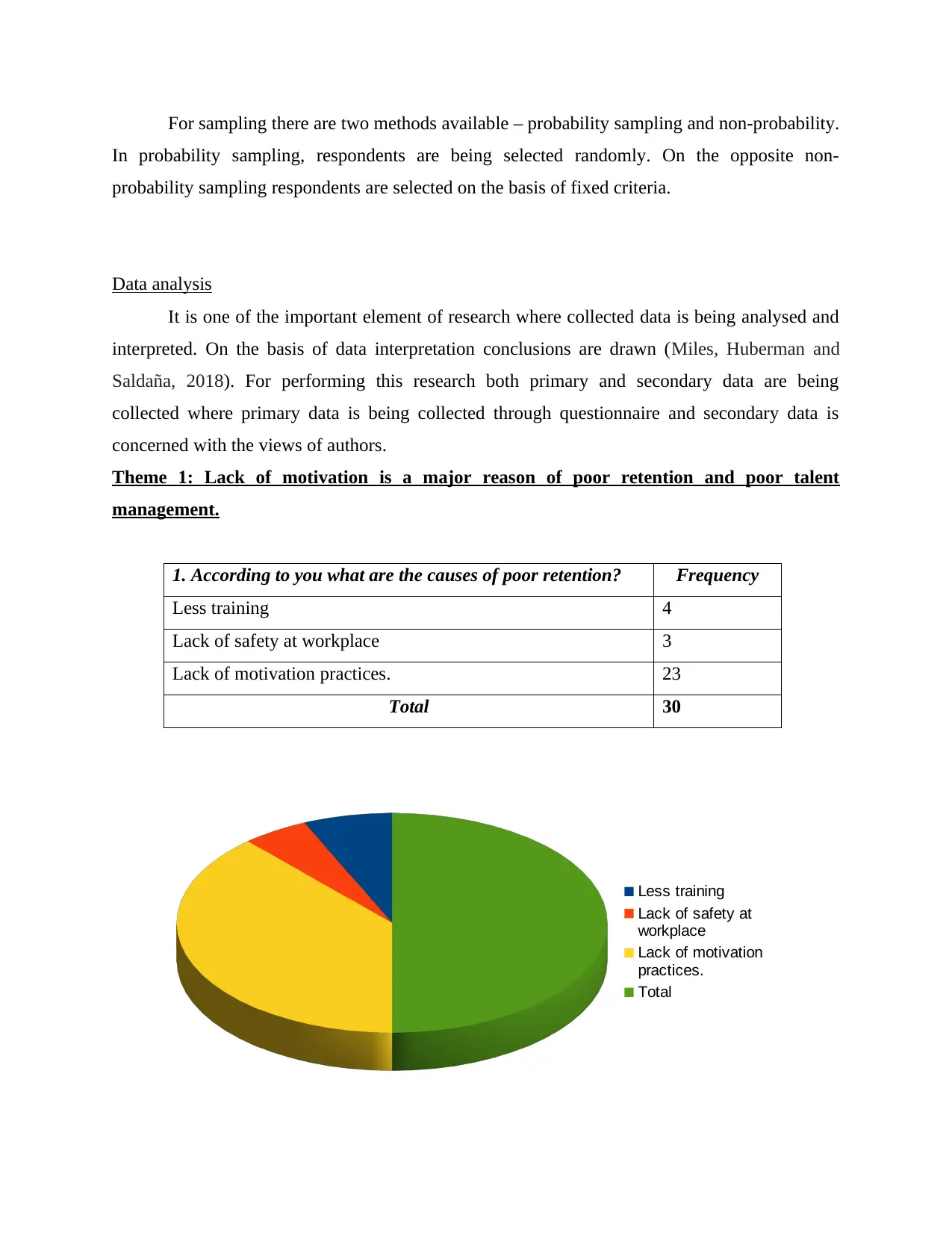
For sampling there are two methods available – probability sampling and non-probability.
In probability sampling, respondents are being selected randomly. On the opposite non-
probability sampling respondents are selected on the basis of fixed criteria.
Data analysis
It is one of the important element of research where collected data is being analysed and
interpreted. On the basis of data interpretation conclusions are drawn (Miles, Huberman and
Saldaña, 2018). For performing this research both primary and secondary data are being
collected where primary data is being collected through questionnaire and secondary data is
concerned with the views of authors.
Theme 1: Lack of motivation is a major reason of poor retention and poor talent
management.
1. According to you what are the causes of poor retention? Frequency
Less training 4
Lack of safety at workplace 3
Lack of motivation practices. 23
Total 30
Less training
Lack of safety at
workplace
Lack of motivation
practices.
Total
In probability sampling, respondents are being selected randomly. On the opposite non-
probability sampling respondents are selected on the basis of fixed criteria.
Data analysis
It is one of the important element of research where collected data is being analysed and
interpreted. On the basis of data interpretation conclusions are drawn (Miles, Huberman and
Saldaña, 2018). For performing this research both primary and secondary data are being
collected where primary data is being collected through questionnaire and secondary data is
concerned with the views of authors.
Theme 1: Lack of motivation is a major reason of poor retention and poor talent
management.
1. According to you what are the causes of poor retention? Frequency
Less training 4
Lack of safety at workplace 3
Lack of motivation practices. 23
Total 30
Less training
Lack of safety at
workplace
Lack of motivation
practices.
Total
You're viewing a preview
Unlock full access by subscribing today!
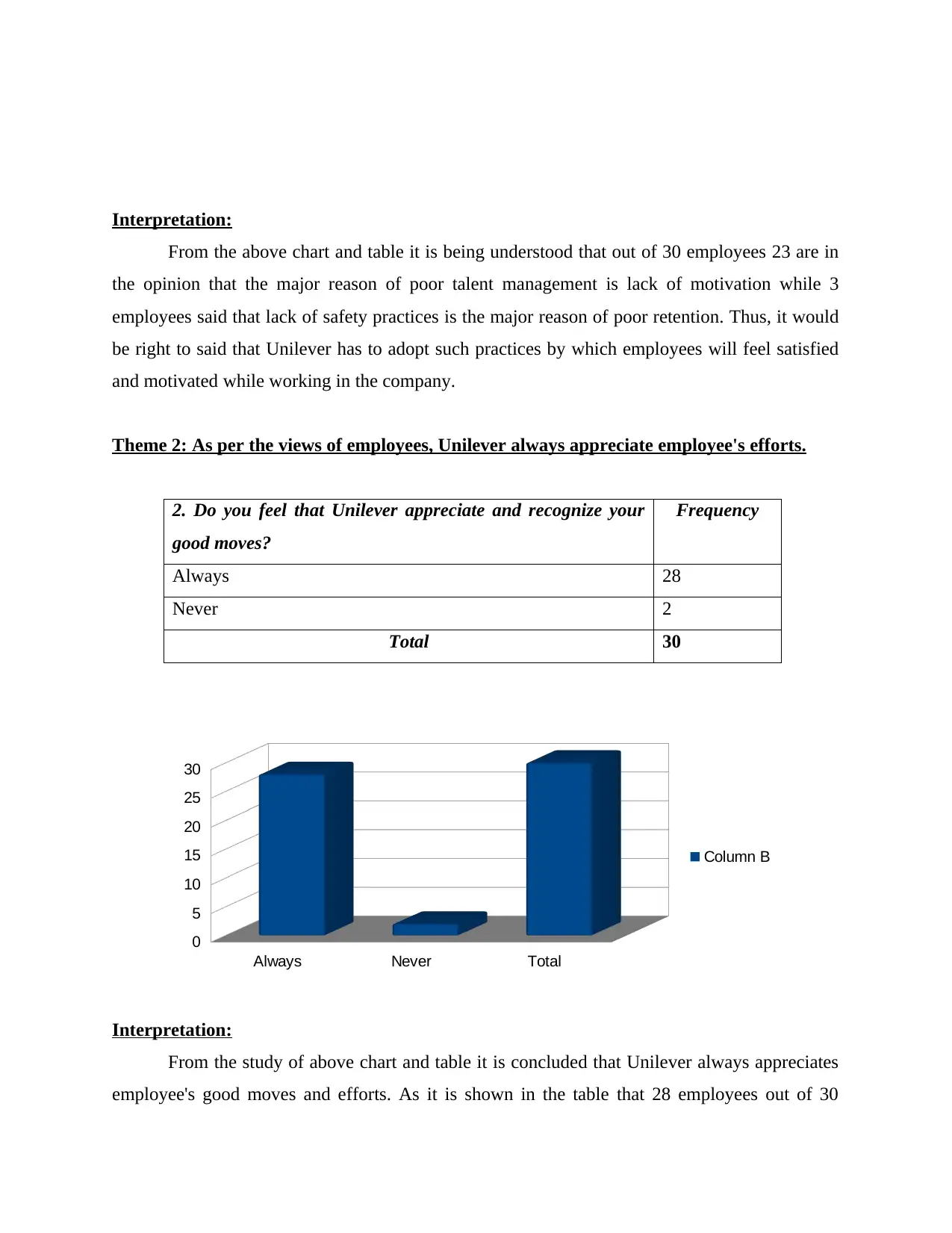
Interpretation:
From the above chart and table it is being understood that out of 30 employees 23 are in
the opinion that the major reason of poor talent management is lack of motivation while 3
employees said that lack of safety practices is the major reason of poor retention. Thus, it would
be right to said that Unilever has to adopt such practices by which employees will feel satisfied
and motivated while working in the company.
Theme 2: As per the views of employees, Unilever always appreciate employee's efforts.
2. Do you feel that Unilever appreciate and recognize your
good moves?
Frequency
Always 28
Never 2
Total 30
Interpretation:
From the study of above chart and table it is concluded that Unilever always appreciates
employee's good moves and efforts. As it is shown in the table that 28 employees out of 30
Always Never Total
0
5
10
15
20
25
30
Column B
From the above chart and table it is being understood that out of 30 employees 23 are in
the opinion that the major reason of poor talent management is lack of motivation while 3
employees said that lack of safety practices is the major reason of poor retention. Thus, it would
be right to said that Unilever has to adopt such practices by which employees will feel satisfied
and motivated while working in the company.
Theme 2: As per the views of employees, Unilever always appreciate employee's efforts.
2. Do you feel that Unilever appreciate and recognize your
good moves?
Frequency
Always 28
Never 2
Total 30
Interpretation:
From the study of above chart and table it is concluded that Unilever always appreciates
employee's good moves and efforts. As it is shown in the table that 28 employees out of 30
Always Never Total
0
5
10
15
20
25
30
Column B
Paraphrase This Document
Need a fresh take? Get an instant paraphrase of this document with our AI Paraphraser
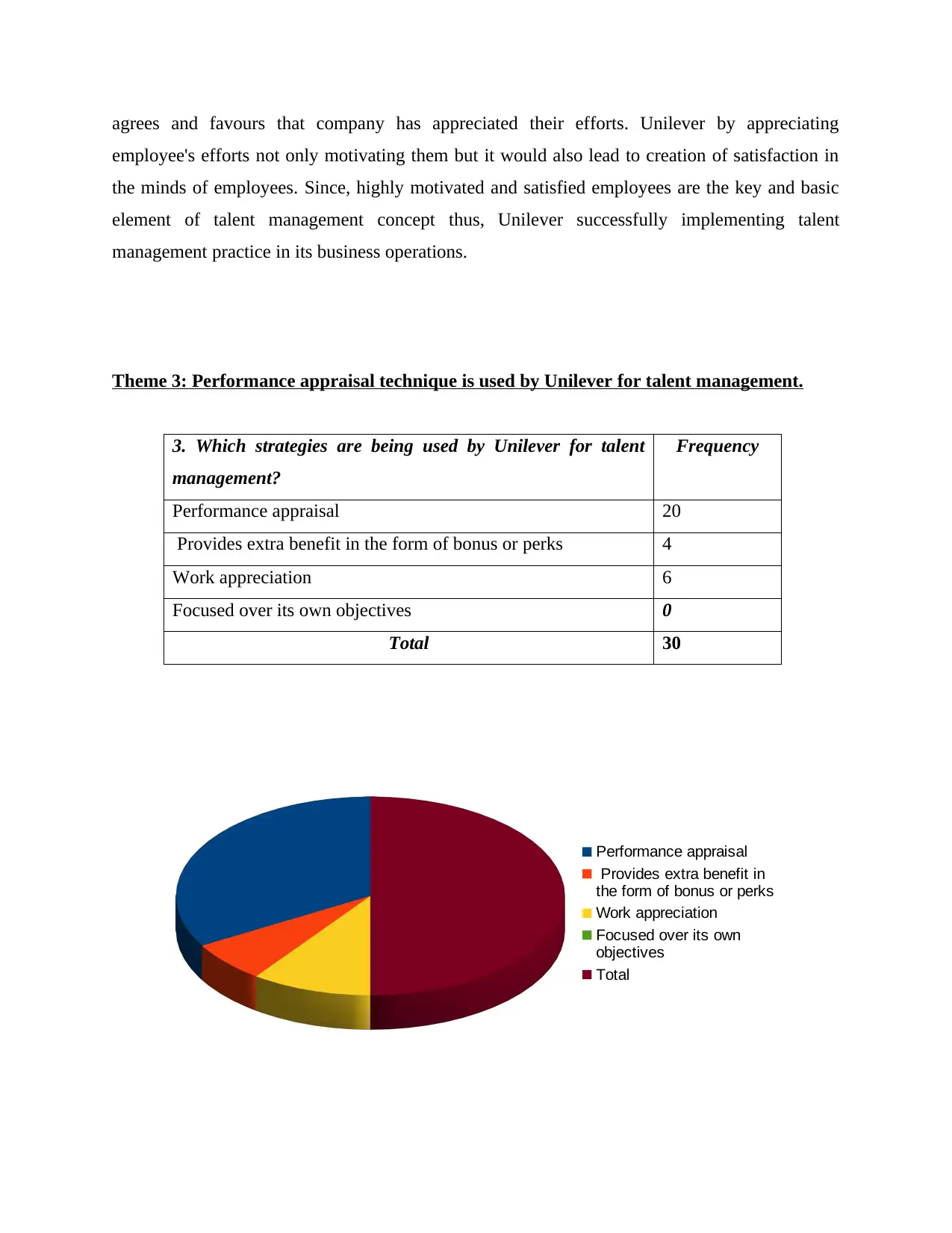
agrees and favours that company has appreciated their efforts. Unilever by appreciating
employee's efforts not only motivating them but it would also lead to creation of satisfaction in
the minds of employees. Since, highly motivated and satisfied employees are the key and basic
element of talent management concept thus, Unilever successfully implementing talent
management practice in its business operations.
Theme 3: Performance appraisal technique is used by Unilever for talent management.
3. Which strategies are being used by Unilever for talent
management?
Frequency
Performance appraisal 20
Provides extra benefit in the form of bonus or perks 4
Work appreciation 6
Focused over its own objectives 0
Total 30
Performance appraisal
Provides extra benefit in
the form of bonus or perks
Work appreciation
Focused over its own
objectives
Total
employee's efforts not only motivating them but it would also lead to creation of satisfaction in
the minds of employees. Since, highly motivated and satisfied employees are the key and basic
element of talent management concept thus, Unilever successfully implementing talent
management practice in its business operations.
Theme 3: Performance appraisal technique is used by Unilever for talent management.
3. Which strategies are being used by Unilever for talent
management?
Frequency
Performance appraisal 20
Provides extra benefit in the form of bonus or perks 4
Work appreciation 6
Focused over its own objectives 0
Total 30
Performance appraisal
Provides extra benefit in
the form of bonus or perks
Work appreciation
Focused over its own
objectives
Total
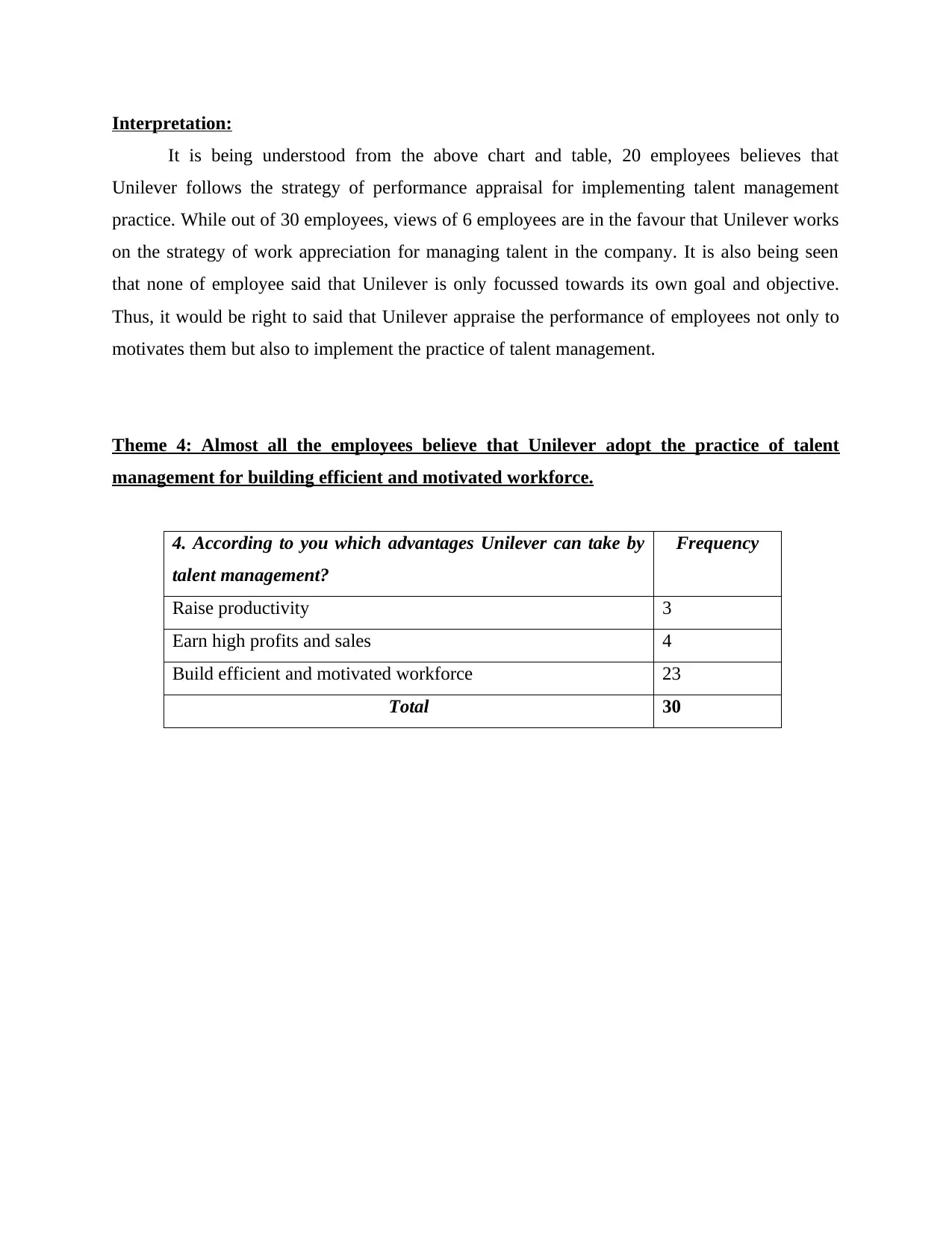
Interpretation:
It is being understood from the above chart and table, 20 employees believes that
Unilever follows the strategy of performance appraisal for implementing talent management
practice. While out of 30 employees, views of 6 employees are in the favour that Unilever works
on the strategy of work appreciation for managing talent in the company. It is also being seen
that none of employee said that Unilever is only focussed towards its own goal and objective.
Thus, it would be right to said that Unilever appraise the performance of employees not only to
motivates them but also to implement the practice of talent management.
Theme 4: Almost all the employees believe that Unilever adopt the practice of talent
management for building efficient and motivated workforce.
4. According to you which advantages Unilever can take by
talent management?
Frequency
Raise productivity 3
Earn high profits and sales 4
Build efficient and motivated workforce 23
Total 30
It is being understood from the above chart and table, 20 employees believes that
Unilever follows the strategy of performance appraisal for implementing talent management
practice. While out of 30 employees, views of 6 employees are in the favour that Unilever works
on the strategy of work appreciation for managing talent in the company. It is also being seen
that none of employee said that Unilever is only focussed towards its own goal and objective.
Thus, it would be right to said that Unilever appraise the performance of employees not only to
motivates them but also to implement the practice of talent management.
Theme 4: Almost all the employees believe that Unilever adopt the practice of talent
management for building efficient and motivated workforce.
4. According to you which advantages Unilever can take by
talent management?
Frequency
Raise productivity 3
Earn high profits and sales 4
Build efficient and motivated workforce 23
Total 30
You're viewing a preview
Unlock full access by subscribing today!
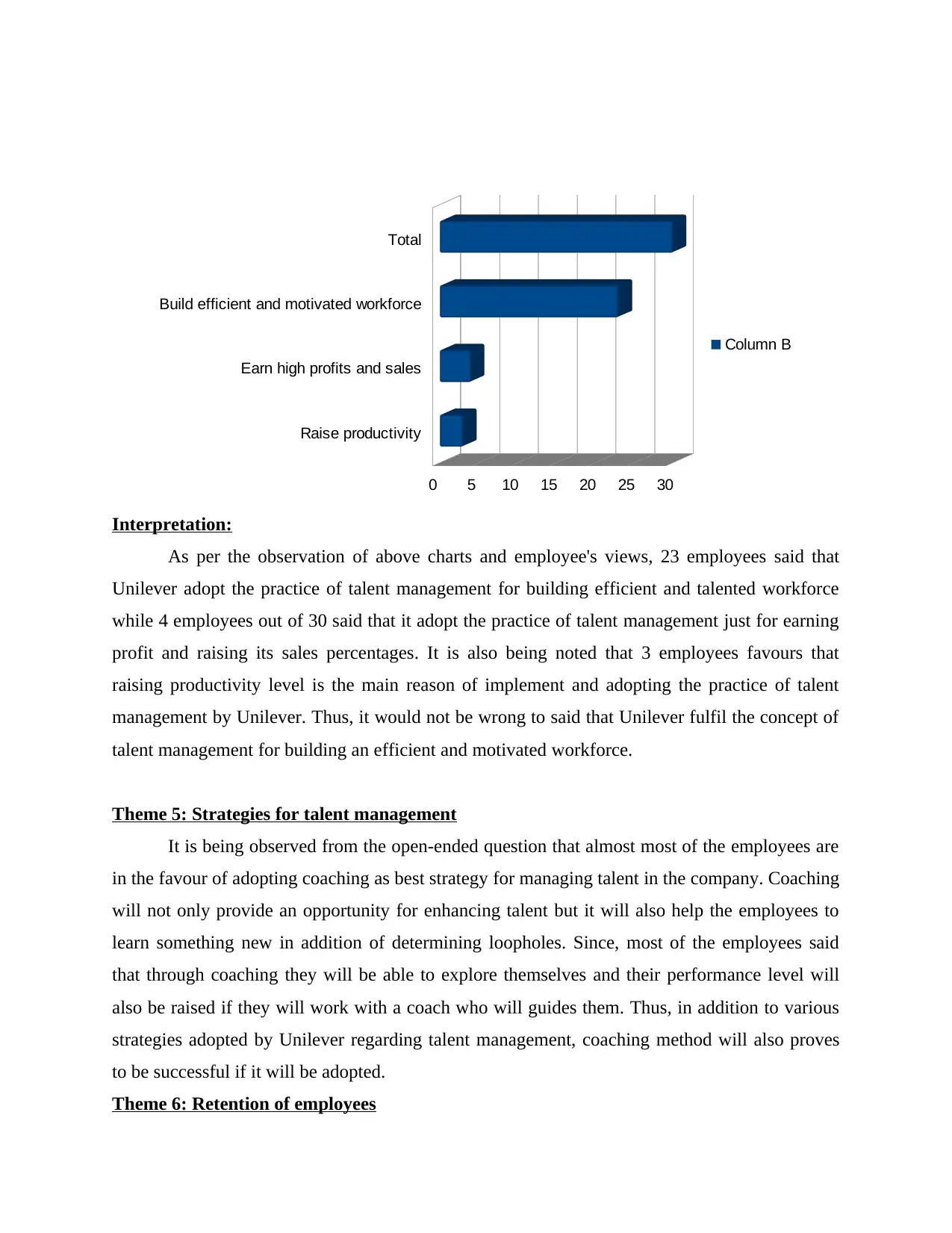
Interpretation:
As per the observation of above charts and employee's views, 23 employees said that
Unilever adopt the practice of talent management for building efficient and talented workforce
while 4 employees out of 30 said that it adopt the practice of talent management just for earning
profit and raising its sales percentages. It is also being noted that 3 employees favours that
raising productivity level is the main reason of implement and adopting the practice of talent
management by Unilever. Thus, it would not be wrong to said that Unilever fulfil the concept of
talent management for building an efficient and motivated workforce.
Theme 5: Strategies for talent management
It is being observed from the open-ended question that almost most of the employees are
in the favour of adopting coaching as best strategy for managing talent in the company. Coaching
will not only provide an opportunity for enhancing talent but it will also help the employees to
learn something new in addition of determining loopholes. Since, most of the employees said
that through coaching they will be able to explore themselves and their performance level will
also be raised if they will work with a coach who will guides them. Thus, in addition to various
strategies adopted by Unilever regarding talent management, coaching method will also proves
to be successful if it will be adopted.
Theme 6: Retention of employees
Raise productivity
Earn high profits and sales
Build efficient and motivated workforce
Total
0 5 10 15 20 25 30
Column B
As per the observation of above charts and employee's views, 23 employees said that
Unilever adopt the practice of talent management for building efficient and talented workforce
while 4 employees out of 30 said that it adopt the practice of talent management just for earning
profit and raising its sales percentages. It is also being noted that 3 employees favours that
raising productivity level is the main reason of implement and adopting the practice of talent
management by Unilever. Thus, it would not be wrong to said that Unilever fulfil the concept of
talent management for building an efficient and motivated workforce.
Theme 5: Strategies for talent management
It is being observed from the open-ended question that almost most of the employees are
in the favour of adopting coaching as best strategy for managing talent in the company. Coaching
will not only provide an opportunity for enhancing talent but it will also help the employees to
learn something new in addition of determining loopholes. Since, most of the employees said
that through coaching they will be able to explore themselves and their performance level will
also be raised if they will work with a coach who will guides them. Thus, in addition to various
strategies adopted by Unilever regarding talent management, coaching method will also proves
to be successful if it will be adopted.
Theme 6: Retention of employees
Raise productivity
Earn high profits and sales
Build efficient and motivated workforce
Total
0 5 10 15 20 25 30
Column B
Paraphrase This Document
Need a fresh take? Get an instant paraphrase of this document with our AI Paraphraser
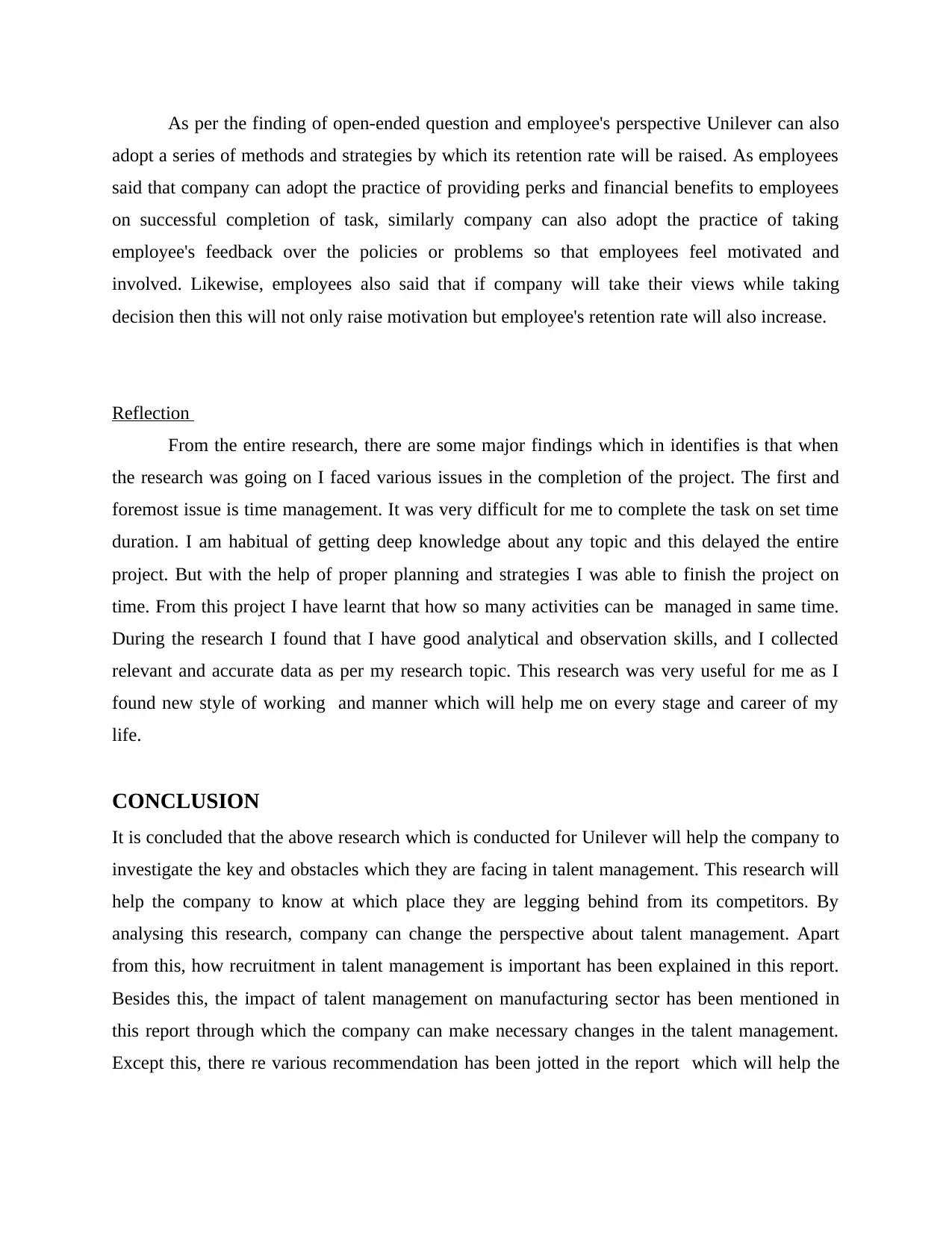
As per the finding of open-ended question and employee's perspective Unilever can also
adopt a series of methods and strategies by which its retention rate will be raised. As employees
said that company can adopt the practice of providing perks and financial benefits to employees
on successful completion of task, similarly company can also adopt the practice of taking
employee's feedback over the policies or problems so that employees feel motivated and
involved. Likewise, employees also said that if company will take their views while taking
decision then this will not only raise motivation but employee's retention rate will also increase.
Reflection
From the entire research, there are some major findings which in identifies is that when
the research was going on I faced various issues in the completion of the project. The first and
foremost issue is time management. It was very difficult for me to complete the task on set time
duration. I am habitual of getting deep knowledge about any topic and this delayed the entire
project. But with the help of proper planning and strategies I was able to finish the project on
time. From this project I have learnt that how so many activities can be managed in same time.
During the research I found that I have good analytical and observation skills, and I collected
relevant and accurate data as per my research topic. This research was very useful for me as I
found new style of working and manner which will help me on every stage and career of my
life.
CONCLUSION
It is concluded that the above research which is conducted for Unilever will help the company to
investigate the key and obstacles which they are facing in talent management. This research will
help the company to know at which place they are legging behind from its competitors. By
analysing this research, company can change the perspective about talent management. Apart
from this, how recruitment in talent management is important has been explained in this report.
Besides this, the impact of talent management on manufacturing sector has been mentioned in
this report through which the company can make necessary changes in the talent management.
Except this, there re various recommendation has been jotted in the report which will help the
adopt a series of methods and strategies by which its retention rate will be raised. As employees
said that company can adopt the practice of providing perks and financial benefits to employees
on successful completion of task, similarly company can also adopt the practice of taking
employee's feedback over the policies or problems so that employees feel motivated and
involved. Likewise, employees also said that if company will take their views while taking
decision then this will not only raise motivation but employee's retention rate will also increase.
Reflection
From the entire research, there are some major findings which in identifies is that when
the research was going on I faced various issues in the completion of the project. The first and
foremost issue is time management. It was very difficult for me to complete the task on set time
duration. I am habitual of getting deep knowledge about any topic and this delayed the entire
project. But with the help of proper planning and strategies I was able to finish the project on
time. From this project I have learnt that how so many activities can be managed in same time.
During the research I found that I have good analytical and observation skills, and I collected
relevant and accurate data as per my research topic. This research was very useful for me as I
found new style of working and manner which will help me on every stage and career of my
life.
CONCLUSION
It is concluded that the above research which is conducted for Unilever will help the company to
investigate the key and obstacles which they are facing in talent management. This research will
help the company to know at which place they are legging behind from its competitors. By
analysing this research, company can change the perspective about talent management. Apart
from this, how recruitment in talent management is important has been explained in this report.
Besides this, the impact of talent management on manufacturing sector has been mentioned in
this report through which the company can make necessary changes in the talent management.
Except this, there re various recommendation has been jotted in the report which will help the
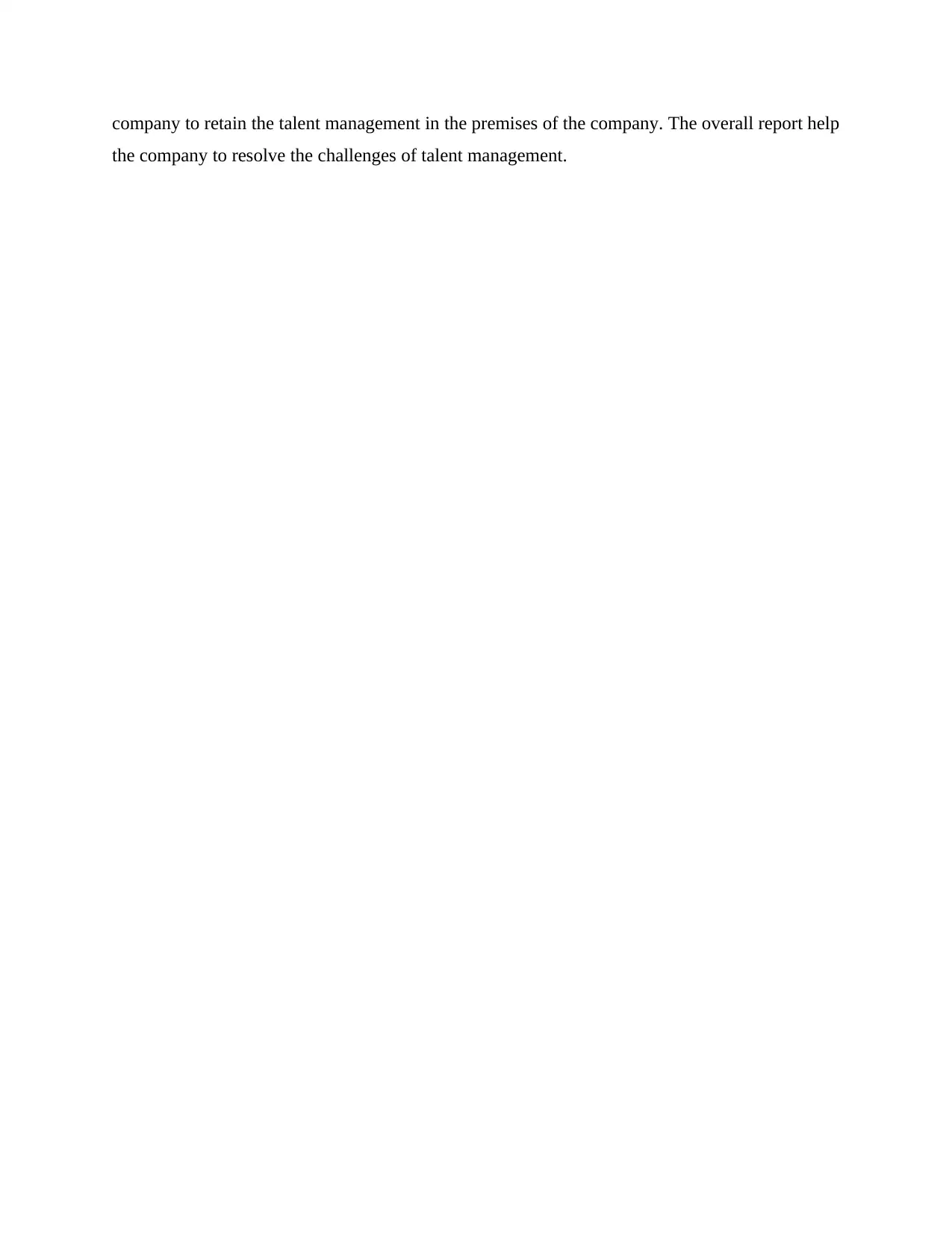
company to retain the talent management in the premises of the company. The overall report help
the company to resolve the challenges of talent management.
the company to resolve the challenges of talent management.
You're viewing a preview
Unlock full access by subscribing today!
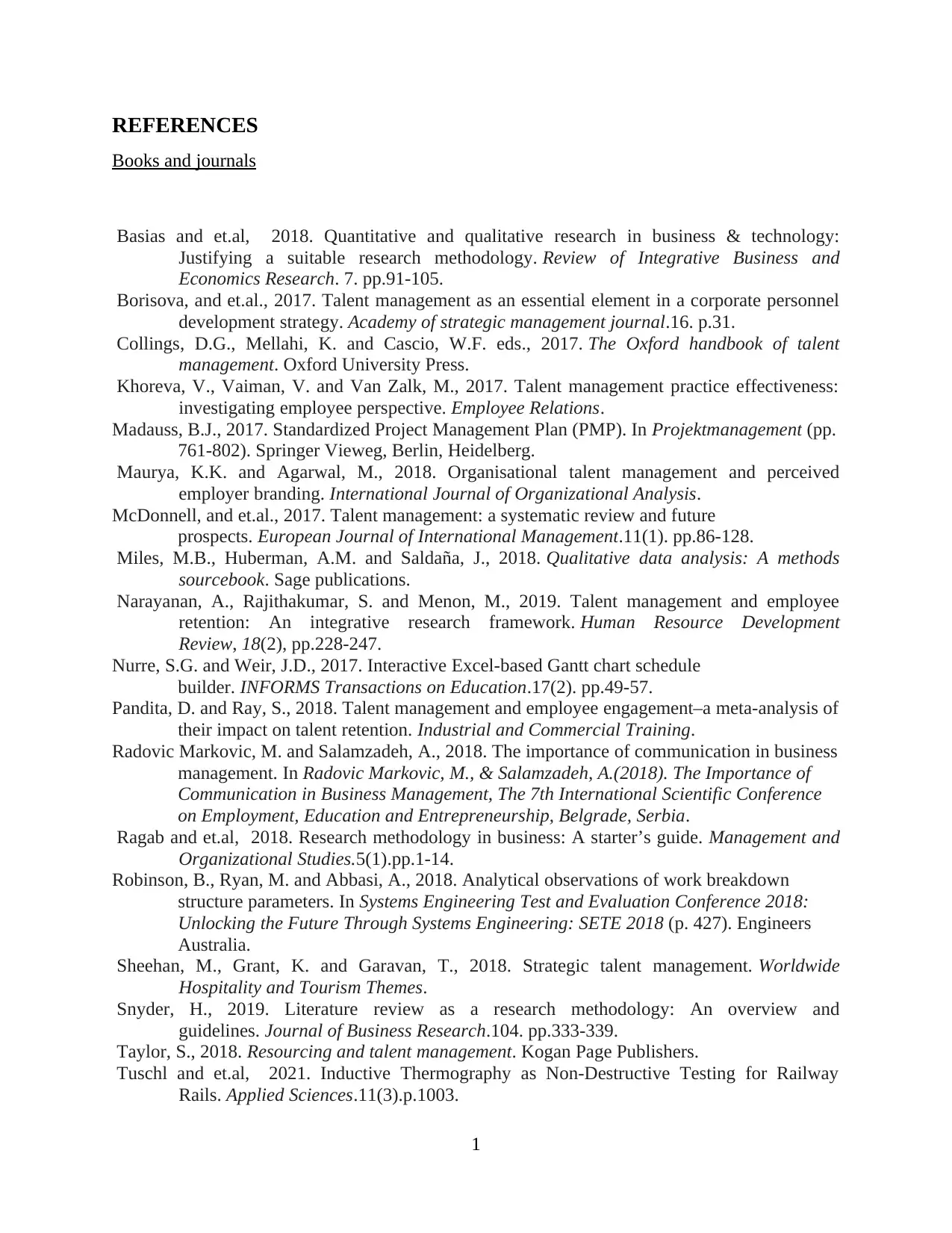
REFERENCES
Books and journals
Basias and et.al, 2018. Quantitative and qualitative research in business & technology:
Justifying a suitable research methodology. Review of Integrative Business and
Economics Research. 7. pp.91-105.
Borisova, and et.al., 2017. Talent management as an essential element in a corporate personnel
development strategy. Academy of strategic management journal.16. p.31.
Collings, D.G., Mellahi, K. and Cascio, W.F. eds., 2017. The Oxford handbook of talent
management. Oxford University Press.
Khoreva, V., Vaiman, V. and Van Zalk, M., 2017. Talent management practice effectiveness:
investigating employee perspective. Employee Relations.
Madauss, B.J., 2017. Standardized Project Management Plan (PMP). In Projektmanagement (pp.
761-802). Springer Vieweg, Berlin, Heidelberg.
Maurya, K.K. and Agarwal, M., 2018. Organisational talent management and perceived
employer branding. International Journal of Organizational Analysis.
McDonnell, and et.al., 2017. Talent management: a systematic review and future
prospects. European Journal of International Management.11(1). pp.86-128.
Miles, M.B., Huberman, A.M. and Saldaña, J., 2018. Qualitative data analysis: A methods
sourcebook. Sage publications.
Narayanan, A., Rajithakumar, S. and Menon, M., 2019. Talent management and employee
retention: An integrative research framework. Human Resource Development
Review, 18(2), pp.228-247.
Nurre, S.G. and Weir, J.D., 2017. Interactive Excel-based Gantt chart schedule
builder. INFORMS Transactions on Education.17(2). pp.49-57.
Pandita, D. and Ray, S., 2018. Talent management and employee engagement–a meta-analysis of
their impact on talent retention. Industrial and Commercial Training.
Radovic Markovic, M. and Salamzadeh, A., 2018. The importance of communication in business
management. In Radovic Markovic, M., & Salamzadeh, A.(2018). The Importance of
Communication in Business Management, The 7th International Scientific Conference
on Employment, Education and Entrepreneurship, Belgrade, Serbia.
Ragab and et.al, 2018. Research methodology in business: A starter’s guide. Management and
Organizational Studies.5(1).pp.1-14.
Robinson, B., Ryan, M. and Abbasi, A., 2018. Analytical observations of work breakdown
structure parameters. In Systems Engineering Test and Evaluation Conference 2018:
Unlocking the Future Through Systems Engineering: SETE 2018 (p. 427). Engineers
Australia.
Sheehan, M., Grant, K. and Garavan, T., 2018. Strategic talent management. Worldwide
Hospitality and Tourism Themes.
Snyder, H., 2019. Literature review as a research methodology: An overview and
guidelines. Journal of Business Research.104. pp.333-339.
Taylor, S., 2018. Resourcing and talent management. Kogan Page Publishers.
Tuschl and et.al, 2021. Inductive Thermography as Non-Destructive Testing for Railway
Rails. Applied Sciences.11(3).p.1003.
1
Books and journals
Basias and et.al, 2018. Quantitative and qualitative research in business & technology:
Justifying a suitable research methodology. Review of Integrative Business and
Economics Research. 7. pp.91-105.
Borisova, and et.al., 2017. Talent management as an essential element in a corporate personnel
development strategy. Academy of strategic management journal.16. p.31.
Collings, D.G., Mellahi, K. and Cascio, W.F. eds., 2017. The Oxford handbook of talent
management. Oxford University Press.
Khoreva, V., Vaiman, V. and Van Zalk, M., 2017. Talent management practice effectiveness:
investigating employee perspective. Employee Relations.
Madauss, B.J., 2017. Standardized Project Management Plan (PMP). In Projektmanagement (pp.
761-802). Springer Vieweg, Berlin, Heidelberg.
Maurya, K.K. and Agarwal, M., 2018. Organisational talent management and perceived
employer branding. International Journal of Organizational Analysis.
McDonnell, and et.al., 2017. Talent management: a systematic review and future
prospects. European Journal of International Management.11(1). pp.86-128.
Miles, M.B., Huberman, A.M. and Saldaña, J., 2018. Qualitative data analysis: A methods
sourcebook. Sage publications.
Narayanan, A., Rajithakumar, S. and Menon, M., 2019. Talent management and employee
retention: An integrative research framework. Human Resource Development
Review, 18(2), pp.228-247.
Nurre, S.G. and Weir, J.D., 2017. Interactive Excel-based Gantt chart schedule
builder. INFORMS Transactions on Education.17(2). pp.49-57.
Pandita, D. and Ray, S., 2018. Talent management and employee engagement–a meta-analysis of
their impact on talent retention. Industrial and Commercial Training.
Radovic Markovic, M. and Salamzadeh, A., 2018. The importance of communication in business
management. In Radovic Markovic, M., & Salamzadeh, A.(2018). The Importance of
Communication in Business Management, The 7th International Scientific Conference
on Employment, Education and Entrepreneurship, Belgrade, Serbia.
Ragab and et.al, 2018. Research methodology in business: A starter’s guide. Management and
Organizational Studies.5(1).pp.1-14.
Robinson, B., Ryan, M. and Abbasi, A., 2018. Analytical observations of work breakdown
structure parameters. In Systems Engineering Test and Evaluation Conference 2018:
Unlocking the Future Through Systems Engineering: SETE 2018 (p. 427). Engineers
Australia.
Sheehan, M., Grant, K. and Garavan, T., 2018. Strategic talent management. Worldwide
Hospitality and Tourism Themes.
Snyder, H., 2019. Literature review as a research methodology: An overview and
guidelines. Journal of Business Research.104. pp.333-339.
Taylor, S., 2018. Resourcing and talent management. Kogan Page Publishers.
Tuschl and et.al, 2021. Inductive Thermography as Non-Destructive Testing for Railway
Rails. Applied Sciences.11(3).p.1003.
1
Paraphrase This Document
Need a fresh take? Get an instant paraphrase of this document with our AI Paraphraser
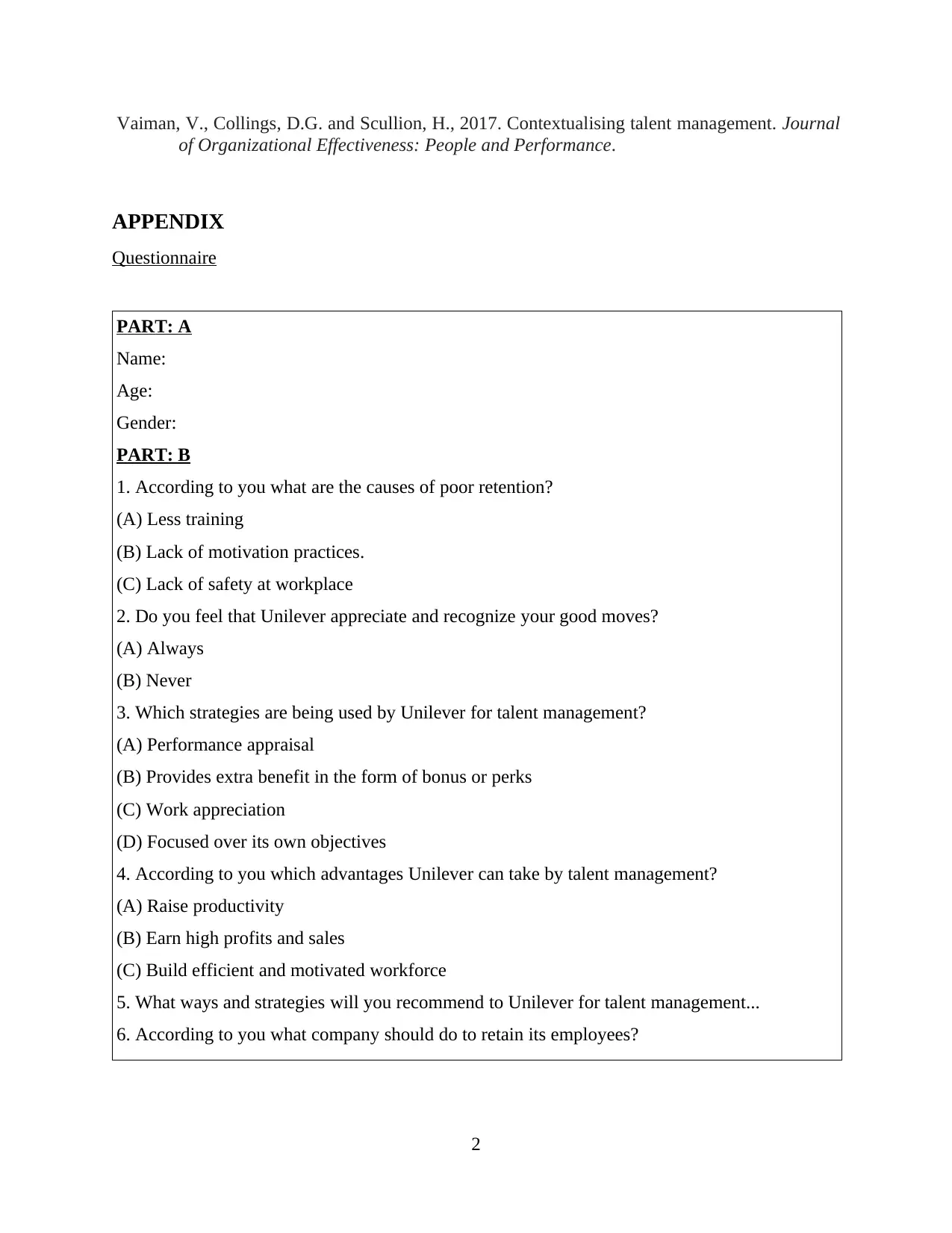
Vaiman, V., Collings, D.G. and Scullion, H., 2017. Contextualising talent management. Journal
of Organizational Effectiveness: People and Performance.
APPENDIX
Questionnaire
PART: A
Name:
Age:
Gender:
PART: B
1. According to you what are the causes of poor retention?
(A) Less training
(B) Lack of motivation practices.
(C) Lack of safety at workplace
2. Do you feel that Unilever appreciate and recognize your good moves?
(A) Always
(B) Never
3. Which strategies are being used by Unilever for talent management?
(A) Performance appraisal
(B) Provides extra benefit in the form of bonus or perks
(C) Work appreciation
(D) Focused over its own objectives
4. According to you which advantages Unilever can take by talent management?
(A) Raise productivity
(B) Earn high profits and sales
(C) Build efficient and motivated workforce
5. What ways and strategies will you recommend to Unilever for talent management...
6. According to you what company should do to retain its employees?
2
of Organizational Effectiveness: People and Performance.
APPENDIX
Questionnaire
PART: A
Name:
Age:
Gender:
PART: B
1. According to you what are the causes of poor retention?
(A) Less training
(B) Lack of motivation practices.
(C) Lack of safety at workplace
2. Do you feel that Unilever appreciate and recognize your good moves?
(A) Always
(B) Never
3. Which strategies are being used by Unilever for talent management?
(A) Performance appraisal
(B) Provides extra benefit in the form of bonus or perks
(C) Work appreciation
(D) Focused over its own objectives
4. According to you which advantages Unilever can take by talent management?
(A) Raise productivity
(B) Earn high profits and sales
(C) Build efficient and motivated workforce
5. What ways and strategies will you recommend to Unilever for talent management...
6. According to you what company should do to retain its employees?
2

3
You're viewing a preview
Unlock full access by subscribing today!
1 out of 21
Related Documents
Your All-in-One AI-Powered Toolkit for Academic Success.
+13062052269
info@desklib.com
Available 24*7 on WhatsApp / Email
![[object Object]](/_next/static/media/star-bottom.7253800d.svg)
Unlock your academic potential
© 2024 | Zucol Services PVT LTD | All rights reserved.





